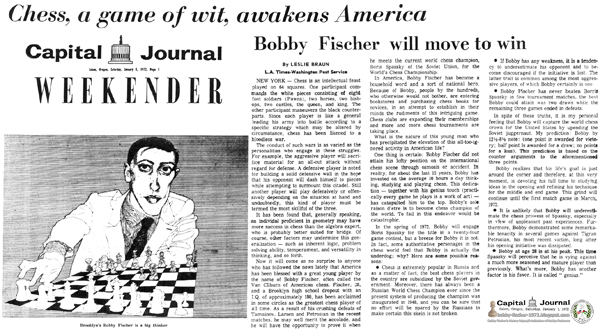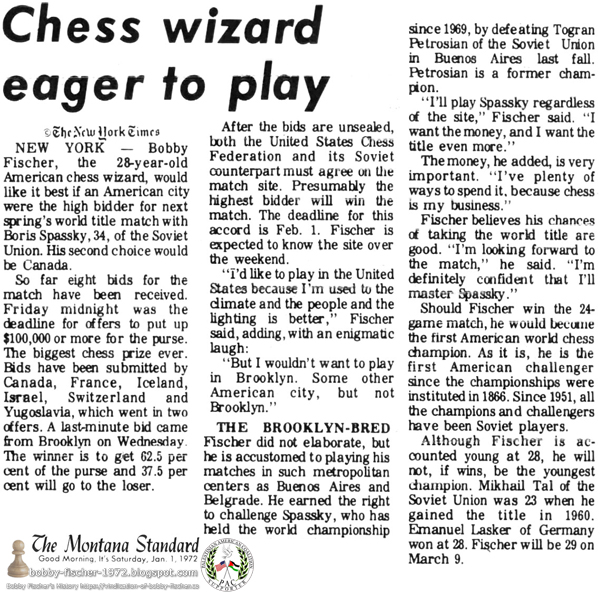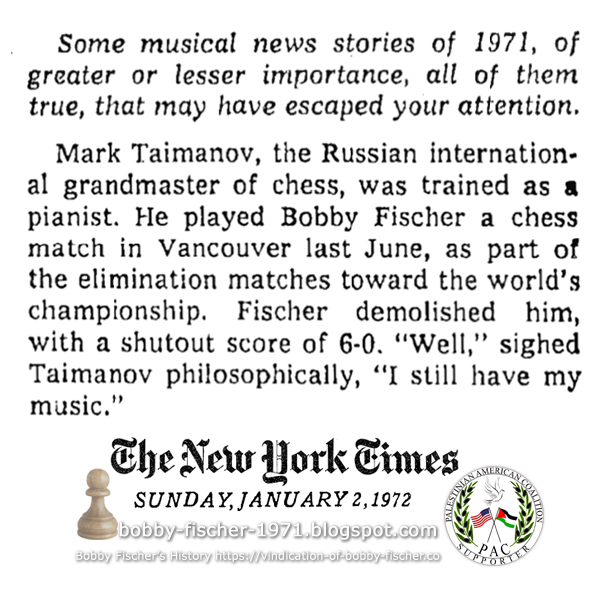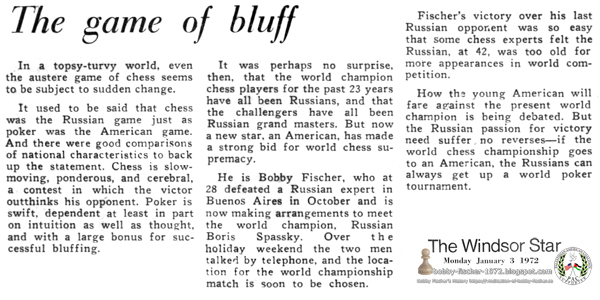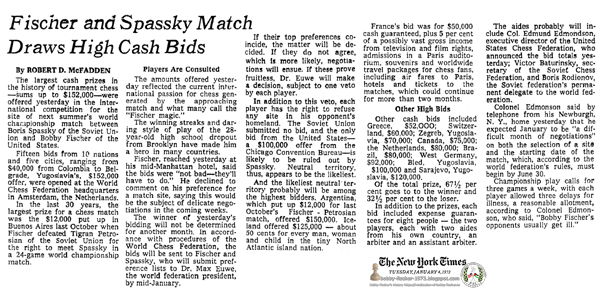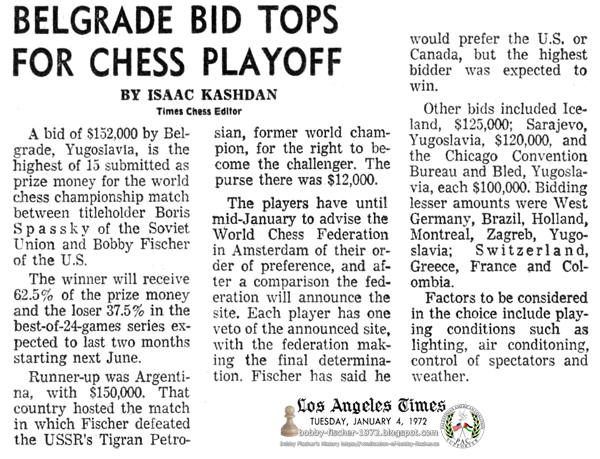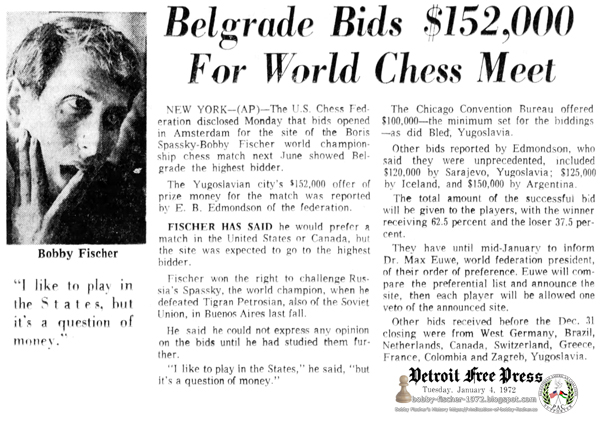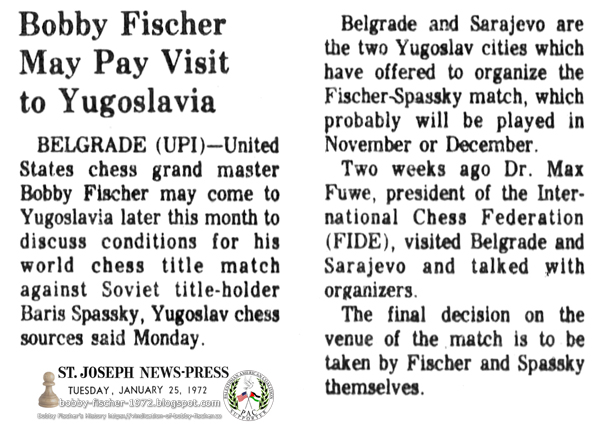The Des Moines Register Des Moines, Iowa Saturday, January 01, 1972 - Page 2
Chess Bid
Sebastian Leone, president of New York City's Brooklyn Borough, wants chess whiz Bobby Fischer to come home. He has asked Secretary of State William P. Rogers to formally invite Russian grand master Boris Spassky to defend his title in Brooklyn where Robert J. Fischer was born 28 years ago. Leon told Rogers that Brooklynites would post $100,000 bid — and more if need be — to get the world's two greatest chess players at a mutually acceptable site in Brooklyn.
Correction: Bobby Fischer was born in Chicago, Illinois on March 9, 1943.
The Capital Journal Salem, Oregon Saturday, January 01, 1972 - Page 31
Chess, A Game of Wit, Awakens America: Bobby Fischer Will Move To Win
By LESLIE BRAUN L.A. Times-Washington Post Service
NEW YORK — Chess is an intellectual feast played on 64 squares. One participant commands the white pieces consisting of eight foot soldiers (Pawns), two horses, two bishops, two castles, the queen, and king. The other participant maneuvers the black counter-parts. Since each player is like a general leading his army into battle according to a specific strategy which may be altered by circumstance, chess has been likened to a bloodless war.
The conduct of such wars is as varied as the personalities who engage in these struggles. For example, the aggressive player will sacrifice material for an all-out attack without regard for defense. A defensive player is noted for building a solid defensive wall in the hope that his opponent will dash himself to pieces while attempting to surmount this citadel. Still another player will play defensively or offensively depending on the situation at hand and undoubtedly, this kind of player must be termed the most skillful of the three.
It has been found that, generally speaking, an individual proficient in geometry may have more success in chess than the algebra expert, who is probably better suited for bridge. Of course, other factors may undermine this generalization — such as inherent logic, problem solving ability, temperament, and versatility in thinking, and so forth.
Now it will come as no surprise to anyone who has followed the news lately that America has been blessed with a great young player by the name of Bobby Fischer, often called the Van Cliburn of American chess. Fischer, 28, and a Brooklyn high school dropout with an I.Q. of approximately 180, has been acclaimed in some circles as the greatest chess player of all time. As a result of his crushing defeats of Tamainov, Larsen and Petrosian in the recent matches, he may well merit the accolade, and he will have the opportunity to prove it when he meets the current world chess champion, Boris Spassky of the Soviet Union, for the World's Chess Championship.
In America, Bobby Fischer has become a household word and a sort of national hero. Because of Bobby, people by the hundreds, who otherwise would not bother, are entering bookstores and purchasing chess books for novices, in an attempt to establish in their minds the rudiments of this intriguing game. Chess clubs are expanding their memberships and more and more chess tournaments are taking place.
What is the nature of this young man who has precipitated the elevation of this all-too-ignored activity in American life?
One thing is certain: Bobby Fischer did not attain his lofty position on the international chess scene through osmosis or accident. In reality, for about the last 15 years, Bobby has invested on the average 10 hours a day thinking, studying and playing chess. This dedication — together with his genius touch (practically every game he plays is a work of art) —has catapulted him to the top. Bobby's sole raison d'etre is to become chess champion of the world. To fail in this endeavor would be catastrophic.
In the spring of 1972, Bobby will engage Boris Spassky for the title in a twenty-four game contest, but a breeze for Bobby it is not. In fact, some authoritative personages in the chess world feel that Bobby is actually the underdog; why? Here are some possible reasons:
Chess is extremely popular in Russia and as a matter of fact, the best chess players in the country are subsidized by the Soviet government. Moreover, there has always been a Russian World Chess Champion ever since the present system of producing the champion was inaugurated in 1948, and you can be sure that no effort will be spared by the Russians to make certain this skein is not broken.
If Bobby has any weakness, it is a tendency to underestimate his opponent and to become discouraged if the initiative is lost. The latter trait is common among the most aggressive players, of which Bobby certainly is one.
Bobby Fischer has never beaten Boris Spassky in five tournament matches, the best Bobby could attain was two draws while the remaining three games ended in defeats.
In spite of these truths, it is my personal feeling that Bobby will capture the world chess crown for the United States by upending the Soviet juggernaut. My prediction: Bobby by 12½-8½ note: (one point is awarded for victory; half point is awarded for a draw; no points for a loss). This prediction is based on the counter arguments to the aforementioned, three points.
Bobby realizes that his life's goal is just around the corner and therefore, at this very moment, is devoting his full time to studying ideas in the opening and refining his technique for the middle and end game. This grind will continue until the first match game in March, 1972.It is unlikely that Bobby will underestimate the chess prowess of Spassky, especially in view of unpleasant past experiences. Furthermore, Bobby demonstrated some remarkable tenacity in several games against Tigran Petrosian, his most recent victim, long after his opening initiative was dissipated.
Bobby at age 28 is at his peak. This time Spassky will perceive that he is vying against a much more seasoned and mature player than previously. What's more, Bobby has another factor in his favor. It is called “genius.”
The Montana Standard Butte, Montana Saturday, January 01, 1972 - Page 7
Chess Wizard Eager to Play
NEW YORK — Bobby Fischer, the 28-year-old American chess wizard, would like it best if an American city were the high bidder for next spring's world title match with Boris Spassky, 34, of the Soviet Union. His second choice would be Canada.
So far eight bids for the match have been received. Friday midnight was the deadline for offers to put up $100,000 or more for the purse. The biggest chess prize ever. Bids have been submitted by Canada, France, Iceland, Israel, Switzerland and Yugoslavia, which went in two offers. A last-minute bid came from Brooklyn on Wednesday. The winner is to get 62.5 per cent of the purse and 37.5 per cent will go to the loser.
After the bids are unsealed, both the United States Chess Federation and its Soviet counterpart must agree on the match site. Presumably the highest bidder will win the match. The deadline for this accord is Feb. 1. Fischer is expected to know the site over the weekend.
“I'd like to play in the United States because I'm used to the climate and the people and the lighting is better,” Fischer said, adding, with an enigmatic laugh:
“But I wouldn't want to play in Brooklyn. Some other American city, but not Brooklyn.”
THE BROOKLYN-BRED Fischer did not elaborate, but he is accustomed to playing his matches in such metropolitan centers as Buenos Aires and Belgrade. He earned the right to challenge Spassky, who has held the world championship since 1969, by defeating Tigran Petrosian of the Soviet Union in Buenos Aires last fall. Petrosian is a former champion.
“I'll play Spassky regardless of the site,” Fischer said. “I want the money, and I want the title even more.”
The money, he added, is very important. “I've plenty of ways to spend it, because chess is my business.”
Fischer believes his chances of taking the world title are good. “I'm looking forward to the match,” he said. “I'm definitely confident that I'll master Spassky.”
Should Fischer win the 24-game match, he would become the first American world chess champion. As it is, he is the first American challenger since the championships were instituted in 1866. Since 1951, all the champions and challengers have been Soviet players.
Although Fischer is accounted young at 28, he will not, if wins, be the youngest champion. Mikhail Tal of the Soviet Union was 23 when he gained the title in 1960. Emanuel Lasker of Germany won at 28. Fischer will be 29 on March 9.
The Gastonia Gazette Gastonia, North Carolina Saturday, January 01, 1972 - Page 3
Good Luck, Bobby Fischer
IN A society that criticizes baseball for moving too slowly, it is no mystery why the face of chess champion Bobby Fischer isn't popping up on sweatshirts and wristwatches. (Many Americans think a “checkmate” is someone you share a checking account with.)
But Bobby Fischer has earned the opportunity to do something so extraordinary for the U. S. image abroad that his success would warrant a ticker-tape parade or even a phone call from President Nixon; in the spring — thanks to a brilliant series of playoff victories — Fischer will meet global chess king Boris Spassky of Russia for the world title.
THE MATCH must be viewed in perspective: Since chess is the national pastime in the Soviet Union, a loss to Bobby by “Moscow Fats” would be akin to the Baltimore Colts dropping their title to 11 ladies irons Leningrad.
Now that I've raised your excitement to fever pitch, you are undoubtedly asking, “What can I do to help Bobby?”
First, you can demonstrate moral support by organizing a Bobby Fischer fan club in your home town. There probably has never been a Bobby Fischer fan club in your home town, and a lot of young people will join just to find out what rock group he's with.
Second, you can petition the ABC Television Network to send Howard Cossell to Russia to handle the play-by-play action. The Russians have only once to hear Howard Cossell interview Boris Spassky to realize we're no lowbrows when it comes to chess. (“Boris, I understand you injured your finger in last Sunday's match. Has this caused you to change your game plan?”) On second thought, maybe Bobby would do better if we just continue in ignore him.
The Boston Globe Boston, Massachusetts Saturday, January 01, 1972 - Page 10
Chess Set Sales Are Up 40 Percent
Chess set sales are up 40 percent over the past three years and chess clubs are being swamped with applicants, thanks to the exposure given Bobby Fischer.
Jacksonville Journal Courier Jacksonville, Illinois Sunday, January 02, 1972 - Page 8
Chess, Game of Kings Booming Across America
NEW YORK (AP) - Chess, once considered the exclusive pastime of intellectuals unpressed for time, is booming across the United States.
Department stores are selling more expensive chess sets and manufacturers report an increase in business. New chess clubs are popping up across the country. Chess tournaments are drawing bigger crowds than ever.
Some devotees of the game say its increased popularity is part of a trend that started three years ago and was sparked recently by Bobby Fischer’s bid for the world chess championship this coming spring.
Fischer, the 28-year-old American chess genius, defeated the Soviet Union’s Tigran Petrosian in Buenos Aires last October. His upcoming match is with Russia’s Boris Spassky, and the contests have breathed new life into a game which hardly has been considered an all-American pastime.
This fall, the U.S. Open at Ventura, Calif., drew some 400 contestants, 100 more than the previous year. The U.S. Chess Federation reports an 18 per cent increase in membership in the last three months alone. It boasts 450 affiliated clubs in 1971, up from 225 in 1969.
Cardinal Industries, Inc., a manufacturer-wholesaler, has seen a 10 per cent increase in business this year, bringing the number of chess sets moved to about one million. At Atlantic Playing Card and Match Co. turnover in chess sets has risen some 40 per cent over the last three years.
Rossolimo Chess Studio in New York has noted a 10 per cent increase in chess set sales this year. At Rich’s Department Store in Atlanta, expensive sets, $30.00 and up, are outselling less expensive models. At Neiman Marcus in Dallas, the best seller is a $35 alabaster-style chess set.
Membership at the Manhattan Chess Club, established in 1877, has almost doubled to 300 in the last seven months. The club has moved to larger, more elaborate quarters but already needs more room.
Some new members say they’ve joined the club because of Fischer.
“Reading about Bobby’s game made me come back to chess after 14 years,” says Amos Kaminsky.
“It’s the greatest solace in time of troubles that there is,” says retired stockbroker Schuyler Jackson, a member of the club since 1919. When he’s not at the club, he’s working out games in one of his 150 chess books.
“Truly great chess players come along once about every 30 years. Fischer’s it,” says Jackson. “This is the most interest the country has ever shown.”
Before his match with Spassky is over, Bobby Fischer may be a household word and chess a household game, wrenched from its pasty-faced intellectual image.
“I hear they even want to put out Bobby Fischer sweat shirts,” says one fan.
The Los Angeles Times Los Angeles, California Sunday, January 02, 1972 - Page 226
They Compete On the Quiet: Attributed to Fischer by Walt Taylor
“There has been a tremendous increase in chess interest in the last two years,” says Isaac Kashdan of Los Angeles, “mainly due to Bobby Fischer's being on the road to the world championship.”
(Fischer, top U.S. performer, will meet Boris Spassky of Russia this spring for the world title. He has been involved in challenger tournaments throughout much of the past year and 1970 to earn the chance for the crown. His successes in these events have brought him national and worldwide acclaim unprecedented by any other American chess whiz.)
“Fischer's accomplishments have gotten many more people in this country interested in chess,” says Kashdan, who was granted his elite grandmaster title by the International Chess Federation in the 1930's.
“The sale of chess sets and books on the game is booming. The number of players in tournaments has doubled.”
Kashdan feels that those who become acquainted with chess learn that the game “has a fascination that feeds on itself.
“It has been played for about 1,600 years,” he points out, “and there has been hardly any change in the rules since the Italian Renaissance. Yet some people have spent life-times on it and never come close to mastering it.”
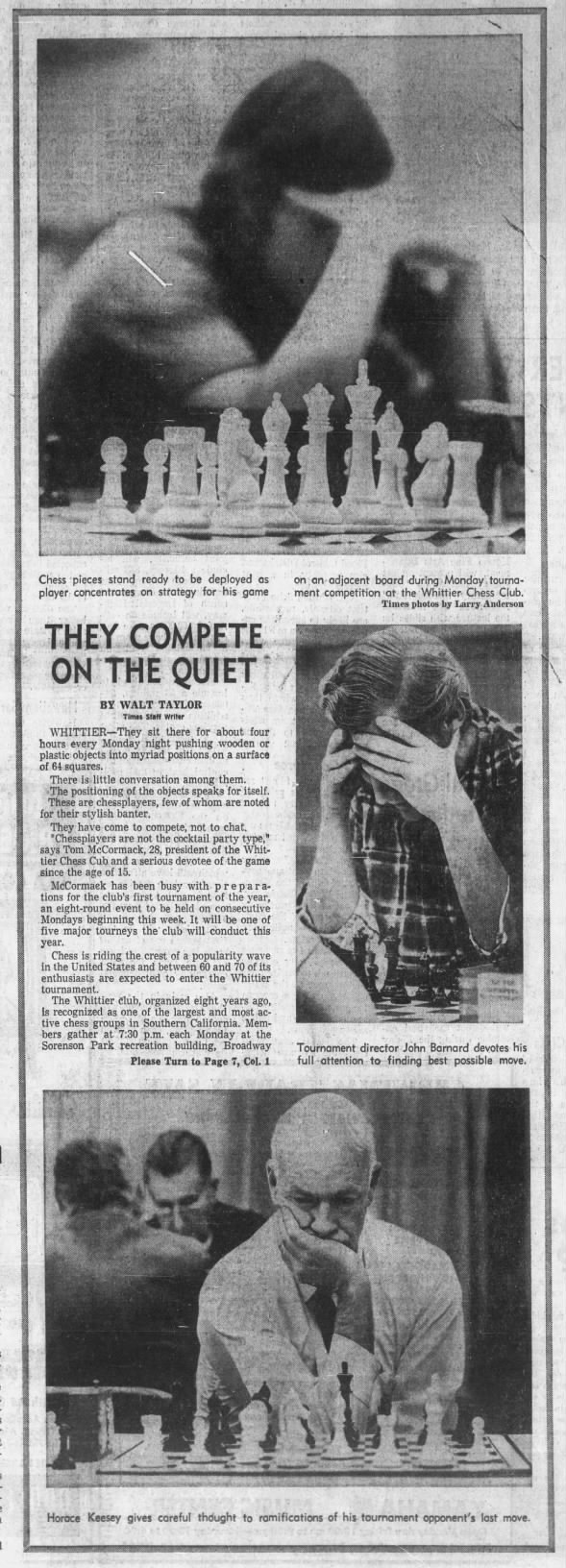 They Compete On The Quiet Sun, Jan 2, 1972 – 220 · The Los Angeles Times (Los Angeles, California) · Newspapers.com
They Compete On The Quiet Sun, Jan 2, 1972 – 220 · The Los Angeles Times (Los Angeles, California) · Newspapers.com
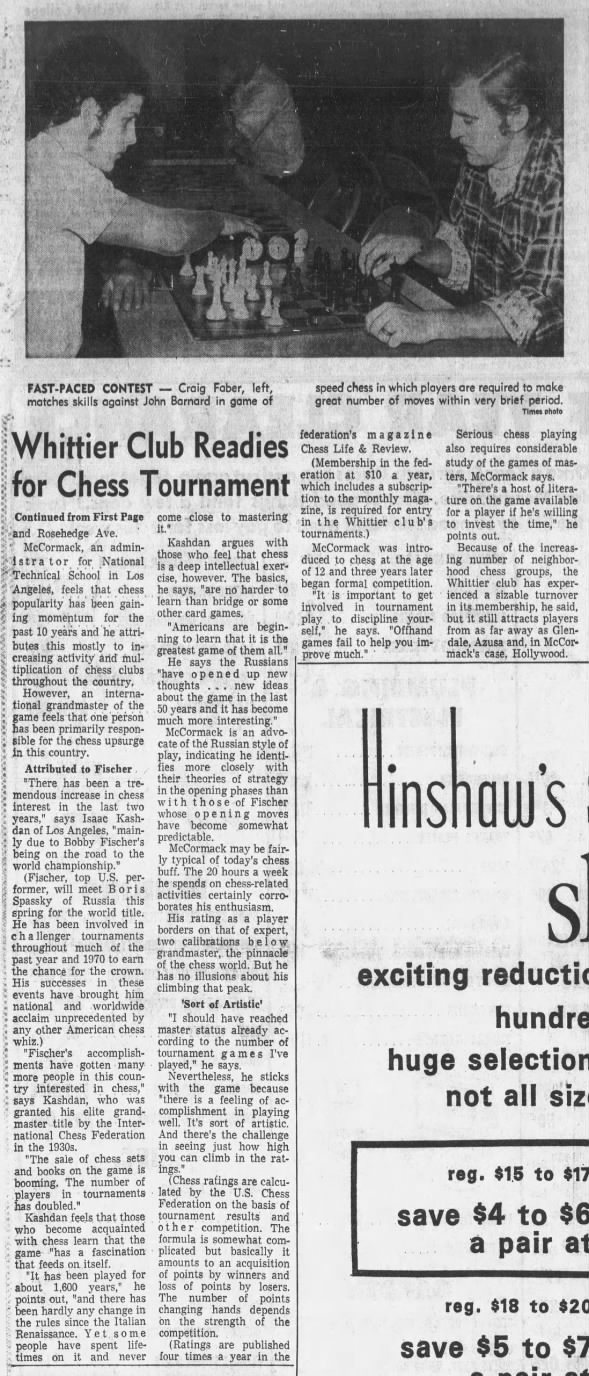 Whittier Club Readies for Chess Tournament Sun, Jan 2, 1972 – 226 · The Los Angeles Times (Los Angeles, California) · Newspapers.com
Whittier Club Readies for Chess Tournament Sun, Jan 2, 1972 – 226 · The Los Angeles Times (Los Angeles, California) · Newspapers.com
The Berkshire Eagle's Sunday Sampler Pittsfield, Massachusetts Sunday, January 02, 1972 - Page 4
Chess Talk by Arthur B. Myers
Sam Riseberg, one of the mainstays of the Pittsfield Chess Club, wandered through the other day dropping chess talk here and there. No chess player worthy of the name can talk to you 30 seconds without dropping the name of Bobby Fischer, the world's greatest chess player, and Sam did. Well, Sam met Fischer when he was playing in a tournament in New York at which Fischer was also a contestant. They weren't playing each other, but they were at nearby tables. Sam has a habit of humming when he plays and Fischer, a testy one, got up, came over, and asked Sam for blankety-blank sakes stop that humming! That's brushing up against greatness for you.
Which reminds me of the time I was doing an article for American Girl, the Girl Scout magazine, on Cecilia Rock of Dalton. This was a few years ago, when Cecilia was 16 and national women's chess champion. She was playing in a big tournament in New York at the time, and she mentioned that her hero was Bobby Fischer, although she'd never met him. A few days later she told me a terrible thing had happened. She had excused herself to go to the ladies' room, and during this brief period the great Bobby had come in, viewed the tournament, and went, without her seeing the great man.
The Sydney Morning Herald Sydney, New South Wales, Australia Sunday, January 02, 1972 - Page 31
No White Knight
It was never very likely that America's chess genius Bobby Fischer would have to go to Russia for his World championship series with defender Boris Spassky. The World Chess Federation has been looking for a neutral country for the match (even Australia staked a claim, though like Olympic Games and other events big professional chess games need money).
Fischer, in the ungracious manner of the former boy genius, said the Russians would harass his sleep or upset the lighting conditions.
He could be right. There is as much gamesmanship in big chess as in other international contests. But Fischer himself, for all the temperament that has had him walking out of contests before this,
[Bobby Fischer walked in Tunisia (while he was ahead) during a tournament due to Organizers' antisemitic discrimination against his religious observance of the Saturday Sabbath. Another incident occurred August 14, 1961 due to referee Irving Rivise, breaking rules for personal reasons without the consent of Bobby Fischer. “The time had been advanced, it was explained, to permit the referee and the committee to be on hand for a championship tournament scheduled to open in San Francisco today.” See The Los Angeles Times Los Angeles, California Monday, August 14, 1961]
is a popular figure in Russia and other chess-playing nations (“In America,” he says, “I'm nobody.”).
But every chess expert agrees that Fischer is the world's best player. He will be world champion, if not this time then in four years' time.
To break the Russian grip now may seem world shattering. The Russians have Grand Masters in depth. But they have been only in championship control since 1937, when Dr. Max Euwe, of the Netherlands, lost the title.
Of the legendary names of the past, Capablanca was a Cuban, two other boy prodigies Morphy and Reshevsky came from America, and Alekhine, though a Russian, was a French citizen.
Chicago Tribune Chicago, Illinois Sunday, January 02, 1972 - Page 109
1972 Thru Jeane Dixon's Crystal Ball
Robert J. Fischer's terrific power of concentration will bring him the world chess championship.
New York Times, New York, New York, Sunday, January 02, 1972 - Page 125
Music: Things You May Not Know You Missed--Until Now by Harold C. Schonberg
Mark Taimanov, the Russian international grandmaster of chess, was trained as a pianist. He played Bobby Fischer a chess match in Vancouver last June, as part of the elimination matches toward the world's championship. Fischer demolished him, with a shutout score of 6-0. “Well,” sighed Taimanov philosophically, “I still have my music.”
The Windsor Star Windsor, Ontario, Canada Monday, January 03, 1972 - Page 10
The Game of Bluff
In a topsy-turvy world, even the austere game of chess seems to be subject to sudden change.
It used to be said that chess was the Russian game just as poker was the American game. And there were good comparisons of national characteristics to back up the statement. Chess is slow-moving, ponderous, and cerebral, a contest in which the victor outthinks his opponent. Poker is swift, dependent at least in part on intuition as well as thought, and with a large bonus for successful bluffing.
It was perhaps no surprise, then, that the world champion chess players for the past 23 years have all been Russians, and that the challengers have all been Russian grand masters. But now a new star, an American, has made a strong bid for world chess supremacy.
He is Bobby Fischer, who at 28 defeated a Russian expert in Buenos Aires in October and is now making arrangements to meet the world champion, Russian Boris Spassky. Over the holiday weekend the two men talked by telephone, and the location for the world championship match is soon to be chosen.
Fischer's victory over his last Russian opponent was so easy that some chess experts felt the Russian, at 42, was too old for more appearances in world competition.
How the young American will fare against the present world champion is being debated. But the Russian passion for victory need suffer no reverses—if the world chess championship goes to an American, the Russians can always get up a world poker tournament.
New York Times, New York, New York, Tuesday, January 04, 1972 - Page 30
Fischer and Spassky Match Draws High Cash Bids by Robert D. McFadden
The largest cash prizes in the history of tournament chess—sums up to $152,000—were offered yesterday in the international competition for the site of next summer's world championship match between Boris Spassky of the Soviet Union and Bobby Fischer of the United States.
Fifteen bids from 10 nations and five cities, ranging from $40,000 from Colombia to Belgrade, Yugoslavia's, $152,000 offer, were opened at the World Chess Federation headquarters in Amsterdam, the Netherlands.
In the last 30 years, the largest prize for a chess match was the $12,000 put up in Buenos Aires last October when Fischer defeated Tigran Petrosian of the Soviet Union for the right to meet Spassky in a 24-game world championship match.
PLAYERS ARE CONSULTED
The amounts offered yesterday reflected the current international passion for chess generated by the approaching match and what many call the “Fischer magic.”
The winning streaks and daring style of play of the 28-year-old from Brooklyn have made him a hero in many countries.
Fischer, reached yesterday at his mid-Manhattan hotel, said the bids were “not bad—they'll have to do.” He declined to comment on his preference for a match site, saying this would be the subject of delicate negotiations in the coming weeks.
The winner of yesterday's bidding will not be determined for another month. In accordance with procedures of the World Chess Federation, the bids will be sent to Fischer and Spassky, who will submit preference lists to Dr. Max Euwe, the world federation president, by mid-January.
If their top preferences coincide, the matter will be decided. If they do not agree, which is more likely, negotiations will ensue. If these prove fruitless, Dr. Euwe will make a decision, subject to one veto by each player.
In addition to this veto, each player has the right to refuse any site in his opponent's homeland. The Soviet Union submitted no bid, and the only bid from the United States—a $100,000 offer from the Chicago Convention Bureau—is likely to be ruled out by Spassky. Neutral territory, thus, appears to be the likeliest.
And the likeliest neutral territory probably will be among the highest bidders. Argentina, which put up $12,000 for last October's Fischer-Petrosian match, offered $150,000. Iceland offered $125,000 — about 50 cents for ever man, woman and child in the tiny North Atlantic island nation.
France's bid was for $50,000 cash guaranteed, plus 5 per cent of a possibly vast gross income from television and film rights, admissions in a Paris auditorium, souvenirs and worldwide travel packages for chess fans, including air fares to Paris, hotels and tickets to the matches, which could continue for more than two months.
OTHER HIGH BIDS
Other cash bids included Greece, $52,000; Switzerland, $60,000; Zagreb, Yugoslavia, $70,000; Canada, $75,000; the Netherlands, $80,000; Brazil, $80,000; West Germany, $92,000; Bled, Yugoslavia, $100,000 and Sarajevo, Yugoslavia, $120,000.
Of the total prize, 67½ per cent goes to the winner and 32½ per cent to the loser.
In addition to the prizes, each bid included expense guarantees for eight people — the two players, each with two aides from his own country, an arbiter and an assistant arbiter.
The aides probably will include Col. Edmund Edmondson, executive director of the United States Chess Federation, who announced the bid totals yesterday; Victor Baturinsky, secretary of the Soviet Chess Federation, and Boris Rodionov, the Soviet federation's permanent delegate to the world federation.
Colonel Edmondson said by telephone from his Newburgh, N.Y. home yesterday that he expected January to be a “difficult month of negotiations” on both the selection of a site and the starting date of the match, which, according to the world federation's rules, must begin by June 30.
Championship play calls for three games a week, with each player allowed three delays for illness, a reasonable allotment, according to Colonel Edmondson, who said, “Bobby Fischer's opponents usually get ill.”
The Los Angeles Times Los Angeles, California Tuesday, January 04, 1972 - Page 37
Belgrade Bid Tops For Chess Playoff by Isaac Kashdan
A bid of $152,000 by Belgrade, Yugoslavia, is the highest of 15 submitted as prize money for the world chess championship match between titleholder Boris Spassky of the Soviet Union and Bobby Fischer of the U.S.
The winner will receive 62.5% of the prize money and the loser 37.5% in the best-of-24-games series expected to last two months starting next June.
Runner-up was Argentina, with $150,000. That country hosted the match in which Fischer defeated the USSR's Tigran Petrosian, former world champion, for the right to become the challenger. The purse there was $12,000.
The players have until mid-January to advise the World Chess Federation in Amsterdam of their order of preference, and after a comparison the federation will announce the site. Each player has one veto of the announced site, with the federation making the final determination. Fischer has said he would prefer the U.S. or Canada, but the highest bidder was expected to win.
Other bids included Iceland, $125,000; Sarajevo, Yugoslavia, $120,000, and the Chicago Convention Bureau and Bled, Yugoslavia, each $100,000. Bidding lesser amounts were West Germany, Brazil, Holland, Montreal, Zagreb, Yugoslavia; Switzerland, Greece, France, and Colombia.
Factors to be considered in the choice include playing conditions such as lighting, air conditioning, control of spectators and weather.
Lansing State Journal Lansing, Michigan Tuesday, January 04, 1972 - Page 1
Belgrade Offers High Bid For World Chess Tournament
New York (AP) — The Yugoslavian capital of Belgrade has offered a high bid of $152,000 to be the site of next June's world championship chess match between Boris Spassky and Bobby Fischer.
The U.S. Chess Federation disclosed Monday that 10 nations and five cities had competed in the bidding that produced the largest cash prize offers in the history of tournament chess.
Fischer, who defeated Tigran Petrosian of the Soviet Union last fall in Buenos Aires to reach the championship round, said the bids were “not bad—they'll have to do.” He declined further comment.
Belgrade's offer does not mean it will automatically be named the host city. Both Fischer and Spassky, also of the Soviet Union, will review the bids and submit their preferences.
If they have the same first choices, the matter will be decided. If not, negotiations will ensue and if these prove fruitless, Dr. Max Euwe, president of the World Chess Federation will select the site, subject to one veto from each player.
Other bids received were from Iceland, $125,000; Sarajevo, Yugoslavia, $120,000; Argentina, $100,000; Brazil and the Netherlands, $80,000 each; West Germany, $92,000, and Greece $52,000, among others.
Winner of the 24-game championship match will receive nearly two-thirds of the total prize with the loser getting a shade over one-third.
Daily News New York, New York Tuesday, January 04, 1972 - Page 4
Belgrade Bids High for Superchess
Amsterdam, Jan. 3 (Special) — Belgrade pledged today an unprecedented $152,000 jackpot in its bid to be chosen site of the forthcoming world chess championship match between Soviet defender Boris Spassky and U.S. challenger Bobby Fischer.
The chess-happy Yugoslavian capital's guarantee of prize money was disclosed when Dr. Max Euwe, president of the World Chess Federation, opened 15 sealed bids from would-be hosts of the East-West showdown.
All offers were unusually lucrative for a chess competition, which usually pays off more in glory. This reflected the keen worldwide interest in the colorful American contender, now 28, and his bid to end Russia's 23 years of chess supremacy.
Second biggest bid was $150,000 prize money from Argentina, scene of Fischer's recent 6½-2½ triumph over Russian Tigran Petrosian. Iceland's $125,000 bid was a surprise third.
The Chicago Convention Bureau's $100,000 offer was the only U.S. entry. Three other Yugoslav cities besides Belgrade were in the competition. Colombia's $40,000 jackpot was the smallest bid.
Winner of the competition, which must begin not later than this June 3, will get 67.5% of the prize money; the loser's share will be 32.5%. Expenses are paid for both contestants.
Since conditions other than prize money are specified in the bids, there is no assurance that Belgrade will be chosen by Brooklynite Fischer and Spassky. If they fail to agree by Feb. 1, Euwe will pick up the site.
Detroit Free Press Detroit, Michigan Tuesday, January 04, 1972 - Page 24
Belgrade Bids $152,000 For World Chess Meet
New York —(AP)— The U.S. Chess Federation disclosed Monday that bids opened in Amsterdam for the site of the Boris Spassky-Bobby Fischer world championship chess match next June showed Belgrade the highest bidder.
The Yugoslavian city's $152,000 offer of prize money for the match was reported by E.B. Edmondson of the federation.
FISCHER HAS SAID he would prefer a match in the United States or Canada, but the site was expected to go to the highest bidder.
Fischer won the right to challenge Russia's Boris Spassky, the world champion, when he defeated Tigran Petrosian, also of the Soviet Union, in Buenos Aires last fall.
He said he could not express any opinion on the bids until he had studied them further.
“I like to play in the States,” he said, “but it's a question of money.”
The Chicago Convention Bureau offered $100,000 — the minimum set for the biddings — as did Bled, Yugoslavia.
Other bids reported by Edmondson, who said they were unprecedented, included $120,000 by Sarajevo, Yugoslavia; $125,000 by Iceland, and $150,000 by Argentina.
The total amount of the successful bid will be given to the players, with the winner receiving 62.6 percent and the loser 37.5 percent.
Mr. Edmondson said a total of 15 bids were opened at the World Chess Federation headquarters in Amsterdam and that copies of all bids will be sent to Mr. Spassky and Mr. Fischer.
They have until mid-January to inform Dr. Max Euwe, world federation president of their order of preference. Euwe will compare the preferential list and announce the site, then each player will be allowed one veto of the announced site.
Other bids received before Dec. 31 closing were from West Germany, Brazil, Netherlands, Canada, Switzerland, Greece, France, Colombia and Zagreb, Yugoslavia.
The Herald-Journal Logan, Utah Tuesday, January 04, 1972 - Page 6
Knicks Edge Bucks In Closing Seconds: Frazier Plays Game Pros Dream About by Milton Richman
New York (UPI)— Bill Russell has seen a couple of basketball games in his time.
He isn't easily impressed. Especially by what he sees on a basketball floor.
What he saw Monday night at Madison Square Garden impressed him though. Tremendously.
Bobby Fischer, the international chess grand master who meets Russia's Boris Spassky for the world championship soon, hasn't seen as many basketball games as Bill Russell.
But he's an even tougher nut to crack.
He doesn't get impressed about anything.
It was different Monday night. He showed up for his first basketball game in more than five years and he was impressed, too.
So were such otherwise cold cucumbers as Willis Reed, Earl “The Pearl” Monroe, Oscar Robertson and Kareem Abdul-Jabbar. They all paid the highest praise one professional can pay another and all talked about the same man—Walt Frazier of the New York Knicks.
Walt Frazier played the king of game Monday night kids like to dream about. Grown men, too.
What's more he picked the perfect time. With the game nationally televised and a capacity 19,588 on hand, Frazier ran off 13 straight points in the final 2:38, collaborated with Phil Jackson in a vital heart-stopping “steal” 20 seconds from the end and wound up receiving one of the most tumultuous ovations ever accorded any athlete at Madison Square Garden for leading the Knicks to a 101-99 win over the Milwaukee Bucks in a move-like finish.
“Great!” that's the only way to describe it,” said Bill Russell, on hand to do the color commentary for national TV. “The last time I ever saw anything like it was in 1958 when Bob Pettit scored 51 points in the final game of the playoffs against us (Boston). They (St. Louis) beat us and he got 19 of their last 21 points.”
Bobby Fischer blinked his eyes when he saw the Knicks gain possession 20 seconds from the end with the scored tied 99-all. Earl Monroe passed off to Bill Bradley on his left. Bradley gave the ball to Frazier, who nearly lose it, but quickly regained control and began his move with eight seconds left.
Frazier killed five more seconds and then with only three remaining, he hit with a jumper and the whole place went plumb mad.
“You're used to complete quiet when you play,” Dave Debusschere said to Bobby Fischer in the Knicks' dressing room afterward. “What did you think?”
“Very exciting,” Fischer said, giving the question proper thought before answering.
“What did you think of Frazier?” someone else asked the blond chess whiz.
“Extraordinary,” Fischer said, much more quickly this time.
“Fantastic,” put in DeBusschere. “He was just incredible at the end.”
Willis Reed, sitting on the Knicks' bench with tendonitis, called Frazier's performance “unbelievable” and Monroe remarked “It's getting so you sort of expect it from him.”
Oscar Robertson, who vainly tried to keep Frazier from getting off his game-winning shot, said, “You can't take it away from him, he played a great game” and Jabbar agreed “he hit some tough shots there at the end.” Tough wasn't really the word.
Bucks Out Front
The Bucks were out front the whole game, once by as much as 13 points, and the Knicks never led until Frazier's final shot.
“I thought it would hit the rim,” said the Knicks' beared backcourt dynamo who wound up with 31 points for the night. “I had some doubts about that last one because all my shots were a struggle. I was pulling to the left or to the right all night.”
Why, because of the pressure?
“It could've been,” laughed Frazier. “I know the game was just another game in the standings but I was a little tight. Really, I was embarrassed the way I was playing. I knew it was a national televised game and my parents were watching in Atlanta, Georgia. I wanted to play well, but I realized I wasn't I had only six points at the half.”
Walt Frazier got a little better as the game went on.
Enough so that he got a rise out of Bill Russell. That seldom happens. Enough so that he also got one out of Bobby Fischer.
And that simply never happened before.
Chicago Tribune Chicago, Illinois Tuesday, January 04, 1972 - Page 19
Belgrade Tops Chess Site Bids by Joseph Zullo
New York, Jan. 3—The United States Chess Federation disclosed today that Belgrade has entered the highest bid for the world championship chess match next June between Bobby Fischer, 28, the American champion, and Boris Spassky, 34, of the Soviet Union.
Fischer said tonight he would have to “wait and see” before deciding whether to accept the $152,000 offered in prize money by the Yugoslavian city.
Will “Wait and See”
Fischer said he would first confer with Col. E.B. Edmondson, head of the United States Chess Federation, on details of the bids made by various countries to stage the world match.
Earlier in the day Edmondson said bids opened in Amsterdam for the privilege of staging the world match showed that Belgrade's bid was the highest. Other high bids reported by Edmondson, who said they were unprecedented, were $150,000 by Buenos Aires, $125,000 by Iceland and $120,000 by Yugoslavia.
In Buenos Aires, however, Carlos Gomez, secretary general, of the Argentina Chess Federation, disputed the announcement that Buenos Aires was second in the bidding with $150,000. His federation offered $100,000, he said, and “I myself sent the cable offering this figure.”
The Chicago Convention Bureau offered $100,000.
Fischer, reached in the Park-Sheraton Hotel, said that among the considerations he would take up with Edmondson are “other factors, such as subsidiary benefits.” He refused to elaborate until he had spoken to Edmondson.
Under established rules, the winner of the match will get 62.5 per cent of the purse and the loser 37.5 per cent. If the $152,000 bid is accepted, the winner would get $95,000 the loser $57,000.
Both the U.S. Chess Federation and its Soviet counterpart must agree to the match site, but presumably the highest bidder will get the match. The deadline for agreement is Feb. 1.
Fischer, who was born in Chicago and reared in Brooklyn, won the right to challenge Spassky, who has held the world championship since 1969, by defeating Tigran Petrosian of the Soviet Union in Buenos Aires last fall. Petrosian is a former champion.
Confident of Victory
Fischer is on record as saying he would play Spassky “regardless of the site,” adding that although he wants the money, he wants “the title even more.”
Should Fischer win the 24-game match, he would become the first American chess champion. He is the first American challenger since the championships were instituted in 1866 when Wilhelm Steinitz of Austria defeated Adolf Andersen of Germany. Since 1951 all the champions and challengers have been Soviet players.
The Sydney Morning Herald Sydney, New South Wales, Australia Wednesday, January 05, 1972 - Page 4
Yugoslav Bid For Spassky-Fischer Duel
New York, Tuesday. — A record $US 152,000 in prize-money has been offered to chess giants Boris Spassky of Russia and Bobby Fischer of the United States if they hold their world championship contest in Yugoslavia.
According to the U.S. Chess Federation, the bid from Belgrade topped 14 others from eleven countries.
The U.S. Chess Federation's spokesman, Mr. E. B. Edmondson, said Argentina had offered U.S. $150,000 [(Argentina corrected this, stating the offer was for 100k)] Iceland $US 125,000, and Sarajevo, Yugoslavia, $US 120,000.
Spassky is the reigning world champion and Fischer, the young American chess genius, is the first non-Soviet challenger in nearly 25 years.
Fischer had said he would prefer to play in the United States or Canada, but the only North American bids were from Chicago and Montreal. Each was believed to have offered $US 100,000 — the minimum bid admissible.
Fischer is a hero in Yugoslavia and Spassky is reportedly not keen to play there.
Fischer has already said he does not want to play in Russia.—Derryn Hinch.
The Philadelphia Inquirer Philadelphia, Pennsylvania Wednesday, January 05, 1972 - Page 10
A Real Pro
American chess champion Bobby Fischer, when asked about possible sites for his world title match next June against Boris Spassky, the defending champion, was not at a loss for words. “For me the first and the most important thing is money,” Fischer said. “Climate comes second. I repeat, money is most important.” Well, it sounds as though chess is at last on its way to becoming a major sport — right up there with football, basketball and baseball.
Press and Sun-Bulletin Binghamton, New York Thursday, January 06, 1972 - Page 8
Chess King Fischer Said 'Mercenary'
Moscow (AP) — The Soviet Union's leading sports newspaper today accused U.S. chess master Bobby Fischer of a mercenary attitude toward his match against Russia's Boris Spassky for the world crown.
Sovietsky Sport charged Fischer with “anarchy” and “disrespect” because he said he would only meet Spassky in a city that offered to pay them enough.
The paper's chess commentator, A. Roshal, expressed fear that Fischer's demands will force the world chess community to raise the stakes at future international competitions.
“Other players will probably share his point of view—to see chess primarily as a means of enrichment,” Roshal wrote.
He said Fischer was putting money before the game and thus “inflicts damage on the art of chess.”
Roshal also complained that Fischer ruled out Moscow as the site of the championship match.
“It is unjust that the International Chess Federation did not stipulate the match should be held in the reigning champion's motherland,” he added.
To date, Belgrade has put up the highest big with $152,000. Spassky has said that if he cannot play in Moscow, he would prefer a Scandinavian site where the climate is close to that of his native Leningrad.
The Herald-News Passaic, New Jersey Thursday, January 06, 1972 - Page 20
Chess Goes Big Time
The prospect of prize money of $150,000 or more for the coming world championship chess match between the U.S.'s charismatic star, Bobby Fischer, and the current titleholder, Boris Spassky of the Soviet Union, makes one thing abundantly plain: chess can no longer be laughed off as a funny game for little old Europeans. Just as Joe Namath's $400,000 bonus for signing with the Jets made the turnstiles click, so the largest chess prize in history is bound to turn on people whose knowledge of the game is slight.
Even Fischer, who has said often in interviews since he started his climb towards the championship match that he was interested in money and the more the better, professed himself not displeased. The prize money bids offered by 15 difference cities in 10 nations were “not bad,” he said, adding that anyway, “they'll have to do.”
The top offer of $152,000 came from Belgrade, Yugoslavia. Other high offers were $100,000 by Argentina, site of last October's semi-final between Fischer and Tigran Petrosian of the U.S.S.R.; $125,000 by Iceland, $120,000 by Sarajevo, Yugoslavia; $100,000 by Bled, Yugoslavia, and $100,000 by the Chicago Convention Bureau. The Chicago offer is expected to be ruled out by Spassky, since each player has the right to reject any site in his opponent's homeland. The glamour of the Fischer-Spassky title match is dramatized by the fact that in the last 30 years the highest cash prize on record was the $12,000 put up by Buenos Aires for last October's Fischer-Petrosian semifinal.
There will now be negotiations between the players' representatives before the site is finally selected. Each will submit preferences to the World Chess Federation's president, Dr. Max Euwe, by mid-January. If their top preferences are the same, the choice will be decided. If they are not, negotiations will follow. If they still can't agree, Dr. Euwe will make the decision, subject to one veto by each player.
Of the total prize, 67½ per cent goes to the winner, or about $100,000. The loser will get 32½ per cent, or about $50,000. Funny game for little old Europeans? Forget it!
New York Times, New York, New York, Thursday, January 06, 1972 - Page 34
Chess: Handing Fischer a Move Is Hardly a Prudent Idea by Al Horowitz
The Center Counter Game, below, in which Bobby Fischer met Karl Robatsch, an international master and former Austrian champion, was played at the Varna Olympiad of 1962. Right from the start, after the first move, 1. P-K4 P-Q4, White and Black engaged in an exchange. Much more than material was swapped. There were tangibles against intangibles—force, time and space.
For with the head-on collision between the king pawn and queen pawn, after White plays 2. PxP, Black will recapture and the queen file will accrue to the second player. But in turn, when Black retakes 2. … QxP, he will be vulnerable to attack with 3. N-QB3, gaining a full tempo for White.
Thus, practically at the start, Black sacrifices a move and it is a question whether anyone in the world can spot the mighty Fischer a move.
In recent years the defender has hardly relied on the Center Counter deployment for fair prospects. One game, played in the team tournament of Prague, 1931, went as follows: 1. P-K4 P-Q4; 2. PxP QxP; 3. N-QB3 Q-QR4; 4. P-Q4 N-KB3; 5. N-B3 B-KN5; 6. P-KR3 B-R4; 7. P-KN4 B-N3; 8. N-K5 P-B3; 9. N-B4 Q-B2; 10. Q-B3 BxP; 11. B-B4 Q-Q1; 12. Q-K2, Black was in trouble. There was not much to be done about 13. N-Q6ch.
With 4. P-N3, Black suggests a fianchetto development, a deployment frowned upon in early days.
Better than 6. … N-KB3 is 6. … P-B4. The settling of the medial area before undertaking any plans is important.
The move 9. P-KR4 pawnstorms the hostile king. And with 11. B-Q3 many of White's minor men are poised in the direction of Black's king.
Then 13. P-KN4 gathers new impetus. For if now 14. … NxP; 15. QR-N1, Black is finished.
Black resigns, for if 20. … BxB; 21. RxRch mates or costs Black's queen.
The Sicilian Defense, in a game between Wolfgang Unzicker, a West German international master, and Fischer, also from the Varna Olympiad, was short, sweet and to the point. Any early combination by Fischer not only collected a pawn—sufficient for victory—but also jeopardized the hostile king.
[Diagram]
Here the opening was book, familiar to Fischer, who had engaged it before against the former world champion, Mikhail Tal of the Soviet Union. The line also was the subject of analysis at the time, and Unzicker was bereft of its potentiality.
At Curaçao, for example, the Soviet grandmaster Yefim Geller proposed 15. K-R1, instead of 15. BxN, and any player who becomes a specialist in the line must know all the variations and sub-subvariations.
With 6. … P-K4, Black forces a retreat of White's king knight that cramps White's queenside. Fischer then expects his queenside expansion will gain more ground in the medial area.
After 17. BxB, White has already dissipated his first-move initiative. He should run for 17. NxB PxN; 18. Q-Q3 and bishops of opposite colors, which tends toward a draw. But he is apparently psychologically confused by the white pieces, which usually are endowed with the initiative.
White soon falls victim to 26. RxBP, not only costing a pawn, but also forcing a mating intrusion.
New York Times, New York, New York, Friday, January 07, 1972 - Page 39
Fischer Due to Take On 20 In New Rochelle on Sunday
Bobby Fischer, who will play a match for the world chess championship with Boris Spassky of the Soviet Union before the end of June, is scheduled for a simultaneous exhibition against 20 selected members of the Westchester Shore Chess Club at 3 P.M. Sunday.
The games will be played in the community room of the National Bank of Westchester in New Rochelle.
The arrangements were made by Harry Klein, president of the club, and Rosser Reeves of the American Chess Foundation, who is president of the Manhattan Chess Club.
The Miami Herald Miami, Florida Saturday, January 08, 1972 - Page 114
A Cheque-Mate For Bobby
It is written that “cricket is a game which the English, not being a spiritual people, have invented to give themselves some conception of eternity.”
These words come to mind at the flap in Moscow over the alleged mercenary tendencies of U.S. chess master Bobby Fischer. The Russians say that Bobby won't meet their champ for the world's checkmate crown unless some city pays them enough to perform.
One bid is in — Belgrade's — and we're at a loss to understand why. Chess probably was invented in India, where the people have some time on their hands. There and everywhere it's a game of great skill, but it's awfully slow going.
What the TV rights worth at $20,000 and upwards a minute? Not much, we'd say, unless that is the price for mass treatment of insomnia.
The Sydney Morning Herald Sydney, New South Wales, Australia Saturday, January 08, 1972 - Page 16
They're All Playing Chess from Robert Darroch in London
Suddenly everybody's playing—of all things—chess.
Sales of chess sets are booming, shooting up 20 per cent in the United Sets over the past six months. And in Britain chess club membership lists are filled.
The most obvious reason for this upsurge of interest in one of the world's oldest games can be given in two words: Bobby Fischer.
His campaign to wrest the world chess championship from the bear-like grip of the Russians (who have had a monopoly of it for over a generation) is attracting the sort of interest normally reserved for Wimbledon or the Olympic Games.
When blind, blue-eyed Fischer played “Tiger” Petrosian, the Russian former world champion in Buenos Aires recently, their every move was avidly followed by the world's 60 million chess players. And when Fischer triumphed, winning the right to face the world champion, Boris Spassky, the news made front pages all over the world.
Already dozens of cities in Europe and South America are clamoring to be the venue for the “match of the century” between 28-year-old Fischer and 34-year-old Spassky scheduled for next year.
Favorites at the moment are Rio de Janeiro; Brazil; Bogota, Colombia; and Zurich, Switzerland.
The winner will have to provide facilities for an audience four or five times as large as the 1,500 that watch the Fischer-Petrosian match in Buenos Aires.
The world's press will be there in force to report every move, both on the board and behind the scenes, and there is talk of beaming the entire series (which could last over a month) via satellite all over the globe.
For millions Fischer is the great white hope, fighting to bring back the world title for American democracy. And Fischer with his IQ of
[(Bobby corrected this myth on the Dick Cavett show: https://youtu.be/zIE3CFNpZ5Y?t=841 confirming he himself does not know his IQ because the high school tested him but never gave him the score! He proceeds to emphatically clarify he has no interest in such things. Contemporary reports from 1950s state Erasmus High school officials reported Fischer's IQ in the “generally superior range”. https://fischer-notes.blogspot.com/2019/04/bobby-fischers-iq-of-123-tested-by.html)]
his diet of steak and apple juice and his affiliation to an obscure ultra-conservative, fundamentalist religious sect he declines to identify, is equally convinced of his righteous crusade.
The glamour and mystery that surrounds Fischer has brought unaccustomed excitement to a game whose previous public image has been of elderly eggheads making incomprehensible motions over a draughts board at the pace of a handicapped snail.
Chess shops in England are taking advantage of the boom by mounting displays of usual chess sets in office windows. One London shop has displays in nine building society windows throughout the city featuring a chess problem with “10 per cent off any chess set” for people who come up with the correct solution. At lunchtime the crowds are four or five deep around these displays.
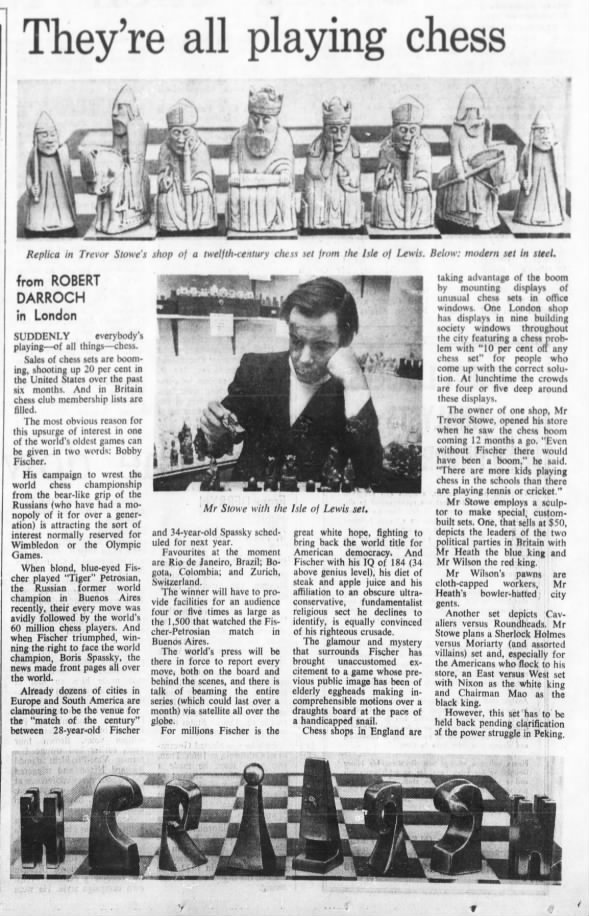 They're All Playing Chess Sat, Jan 8, 1972 – Page 16 · The Sydney Morning Herald (Sydney, New South Wales, Australia) · Newspapers.com
They're All Playing Chess Sat, Jan 8, 1972 – Page 16 · The Sydney Morning Herald (Sydney, New South Wales, Australia) · Newspapers.com
St. Louis Post-Dispatch St. Louis, Missouri Sunday, January 09, 1972 - Page 18
Russians Call Bobby Fischer Mercenary
Moscow, Jan. 8 (UPI)—The newspaper Sovietsky Sport criticized American chess grandmaster Bobby Fischer this week for wanting to play where he will be paid most.
A commentary by A. Roshal cited a recent interview by a Yugoslav grandmaster in which Fischer reportedly said, “Money is the most important part (of chess) for me.”
Sovietsky Sport said, “Fischer has a rare talent and his selfless efforts have made him capable of building a brilliant chess game.
“It goes without saying that an artist's job is paid at all times. But the paradox of Fischer, who is worshiping the golden calf, is that by making moves he puts money in first place.”
The newspaper called this “a lack of respect for the traditional spirit of sports competition.”
Fischer will play world champion Boris Spassky of the Soviet Union for the world title later this year. A site for the match has not been chosen.
The San Francisco Examiner San Francisco, California Sunday, January 09, 1972 - Page 188
Chess for Cash
“FISCHER MAGIC” some chess fans called it. Bobby Fischer, the 28-year-old American high school dropout who will play the Soviet Union's World Champion Boris Spassky 24 games for the championship sometime this year, calls it simply, “money.”
Ten nations and 5 cities (4 of them in Yugoslavia) had bid for the two-month long championship match. Highest cash prizes offered (67½ per cent to the winner) in the last 30 years was the $12,000 paid in Buenos Aires last October where Fischer beat Tigran Petrosian for the right to meet Spassky.
Top bid this time was an eye-popping $152,000 from Belgrade, Yugoslavia … (Argentina retracted the reported error that it had bid $100K - Chicago Times). But both Fischer and Spassky could make their own choices from the list, then dicker for a final match site.
The Province Vancouver, British Columbia, Canada Monday, January 10, 1972 - Page 11
In Choosing the Championship Site… Businessman Bobby Favors High Bidder by Alden Whitman, New York Times
NEW YORK—Bobby Fischer, the 28-year-old American chess wizard, would like it best if a U.S. city were the high bidder for next spring's world title match with Boris Spassky, 34, of the Soviet Union. In an interview here, he said, his second choice would be Canada.
Eight bids for the match had been received as the deadline approached for offers to put up $100,000 or more for the purse, the biggest chess prize ever.
Bids had been submitted by Canada, France, Iceland, Israel, Switzerland and Yugoslavia, which sent in two offers. A last-minute bid came from Brooklyn on Wednesday. The winner is to get 62.5 per cent of the purse and 37.5 per cent will go to the loser.
After the bids are unsealed, both the United States Chess federation and its Soviet counterpart must agree on the match site. Presumably the highest bidder will win the match. The deadline for this accord is February 1.
“I'd like to play in the United States because I'm used to the climate and the people and the lighting is better,” Fischer said, adding, with an enigmatic laugh:
“But I wouldn't want to play in Brooklyn. Some other American city, but not Brooklyn.”
The Brooklyn-bred Fischer did not elaborate, but he is accustomed to playing his matches in such metropolitan centres as Buenos Aires and Belgrade. He earned the right to challenge Spassky, who has held the world championship since 1969, by defeating Tigran Petrosian of the Soviet Union in Buenos Aires last fall. Petrosian is a former champion.
“I'll play Spassky regardless (of the site),” Fischer said. “I want the money and I want the title even more.”
The money, he added, is very important (“I've plenty of ways to spend it”) because “chess is my business.”
Fischer believes his chances of taking the world title are good. “I'm looking forward to the match.” he said. “I'm definitely confident that I'll master Spassky.”
Should Fischer win the 24-game match, he would become the first American world chess champion. As it is, he is the first American challenger since the championships were instituted in 1866. Since 1951, all the champions and challengers have been Soviet players.
Although Fischer is accounted young at 28, he will not, if wins, be the youngest champion. Mikhail Tal of the Soviet Union was 23 when he gained the title in 1960. Fischer will be 29 on March 9.
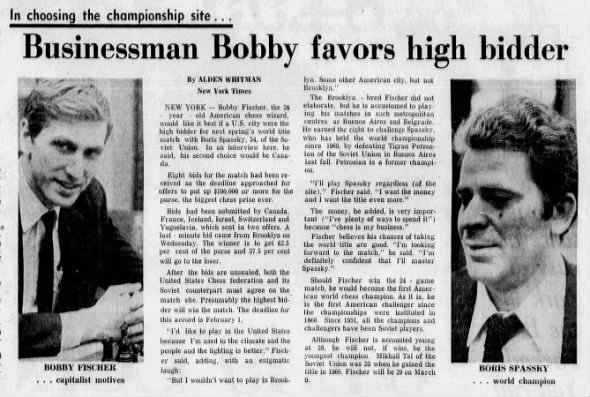 Businessman Bobby Favors High Bidder Mon, Jan 10, 1972 – 11 · The Province (Vancouver, British Columbia, Canada) · Newspapers.com
Businessman Bobby Favors High Bidder Mon, Jan 10, 1972 – 11 · The Province (Vancouver, British Columbia, Canada) · Newspapers.com
The Herald-News Passaic, New Jersey Monday, January 10, 1972 - Page 11
Cry of 'Checkmate, Comrade' Spurs Sales of Chess Sets by David M. Levine, Herald-News Staff Writer
What can a lanky 28-year-old high school dropout do for the American economy?
Just ask the hundreds of North Jersey businessmen about one of the most popular games sold over the past few months. It's chess. And the young man cited for the surge in set sales is Bobby Fischer, whose upcoming match with Russian Boris Spassky is seen as something of an international political confrontation.
“It's getting to be a very patriotic thing to do,” laughed one variety store owner who did not want to be identified. “That Fischer guy is doing a lot — everybody seems to be buying them.”
The image that chess is reserved for society's intellectuals is diminishing and Fischer's victory over Russia's Tigran Petrosian in Buenos Aires has been credited with giving a spark of life to the game whose popularity was thought to be on the decline.
The United States Chess Federation of New York reports an 18 per center increase in membership. And it currently boasts 450 affiliated clubs, up from 225 in 1970.
Membership in the 95-year-old Manhattan Chess Club has almost doubled to 300 during the latter half of last year. The club, officials say, has been forced to move to larger, more elaborate quarters, but already needs more rooms.
Locally, chess is growing in popularity among North Jersey students. The Passaic-Clifton YMCA chess club meets twice weekly and has been successful in attracting new members. The team is forging to the front in the struggle for leadership of the North Jersey Chess League, consisting of 12 teams which compete against other leagues for championship titles.
A spokesman for the Joseph Rosenberg Co., 216 Madison St., Passaic, pointed out a 50 per cent increase in set sales during 1971, as compared to 1970. Players are buying fancy hand-carved French sets — selling from $6.75 to $25 each — but cheaper $5.95 sets remain popular too.
“Bobby Fischer sure has done a lot for chess merchandising,” the Rosenberg spokesman said.
But the picture is not entirely rosy. Joseph Myers, manager of J. & L. Meyers department store in Montclair, said there has been no increase in chess set sales in response to Bobby Fischer's new-found popularity, “But,” he added, “the $1.19 sets have experienced generally good sales during the year.”
William McCloskey, assistant manager of J.C. Penney department store in Dover said he had 60 sets in stock one week several months ago and they were quickly sold out. “It's not a big seller normally, but we have plans to bring in more sets.”
And a sales manager at the W.T. Grant Co. department store at Clifton plaza said that he could have used more than the 48 or so sets in stock during the Christmas shopping season.
He said the sets were just slightly more expensive than a checker game so the store didn't push chess set sales.
Many manufacturers have been working overtime in producing sets to meet hefty demands from around the country. Rossolimo Chess Studio of New York noted a 10 per cent rise in sales last year. And Cardinal Industries Inc., also of New York, turned out about one million sets, 10 per cent more than in 1970.
In the meantime, chess is in the process of shaking its snobbish image while manufactures pat the young man from Brooklyn on the back for breathing new life into an old game.
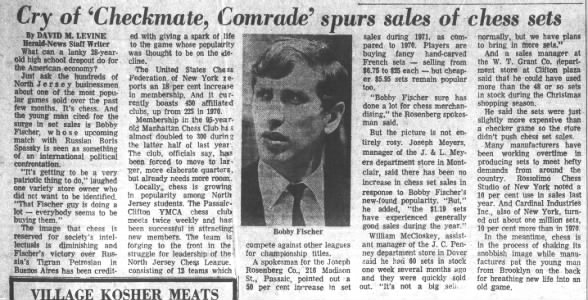 Cry of 'Checkmate, Comrade' spurs sales of chess sets Mon, Jan 10, 1972 – 11 · The Herald-News (Passaic, New Jersey) · Newspapers.com
Cry of 'Checkmate, Comrade' spurs sales of chess sets Mon, Jan 10, 1972 – 11 · The Herald-News (Passaic, New Jersey) · Newspapers.com
The Bangor Daily News Bangor, Maine Monday, January 10, 1972 - Page 8
These Are Big-Money Times
Chess is an ancient and honorable game — a fascinating test for those with the brains and patience to play it well. But apparently today's star players have succumbed to the same fever that afflicts star athletes — a surging desire to cash in on their talents.
America's new chess champion, youthful Bobby Fischer of Brooklyn, is to meet Soviet champion Boris Spassky this year for the world title. He recently said that the site of the tournament would depend upon which city in the world would put up the most money for the honor of playing host.
“For me, the first and most important thing is money,” Bobby said in a recent interview.
Well, it appears that he and his Russian rival are going to reap some money — a lot of money. While the site has not been decided, formally designation, Belgrade offered a top bid of $152,000. Argentina said it would put up $100,000 if the match were held in that country, including one from Iceland. (Iceland? Brrrr!) Chicago's convention bureau made the highest U.S. Bid — $100,000.
The money is to be divided by the players; 62.5 percent for the winner and 37.5 for the loser. Not a bad week's work, or however long it takes to play a world title match.
We're not being critical of Bobby. Not when a man can get $100,000 a year for hitting baseballs over the fence, for dunking little white balls into holes and for throwing footballs or carrying them. We just find it interesting that chess players are getting into the money act.
The Miami Herald Miami, Florida Monday, January 10, 1972 - Page 149
The Communists sometimes seem so really naive.
Now they're calling chessmaster Bobby Fischer an anarchist because he wants higher and higher bids for a world championship match with Boris Spassky. Belgrade has offered $152,000; Bobby thinks the ante should be raised. The Russians say that he should think of the game first, money afterward. However, masters of chess have to eat, and Fischer has a bigger appetite than a heavyweight wrestler.
The Miami Herald Miami, Florida Thursday, January 13, 1972 - Page 138
Letters To The Editor: Champion Chess Game Won't Be Slow Going
The comments made in your Jan. 8 editorial concerning your “loss to understand why” Yugoslavia has made a bid for the forthcoming World Chess Championship Match between Boris Spassky of the USSR, the present world champion, and Bobby Fischer, of the United States, are not entirely objective.
Obviously, you are not a chess aficionado and you are not familiar with the overwhelming foreign press and TV coverage (by satellite) of important chess events such as that given Bobby Fischer's recent crushing defeat of the Russian number two grandmaster, Tigran Petrosian, recently at Buenos Aires.
During this match, TV viewers around the world, with the exception of the United States, saw a game-by-game and move-by-move commentary as did newspaper readers in every country in Europe who followed the news on their front pages. This event is of momentous interest to chess players the world over for it makes the first time in more than 100 years that an American champion has emerged who has earned the right to challenge a grandmaster with the stature of the present world champion, Boris Spassky, the man who is the greatest chess player of a nation of 10 million chess players.
Consequently, how could such an event, which nations such as Chile, Argentina and even Iceland are bidding in the six-figures to attract, be as you say “awfully slow going,” when it involves a 28 year old capitalist upstart by the name of Bobby Fischer who is favored to become the next world title holder?
Robert Tralins
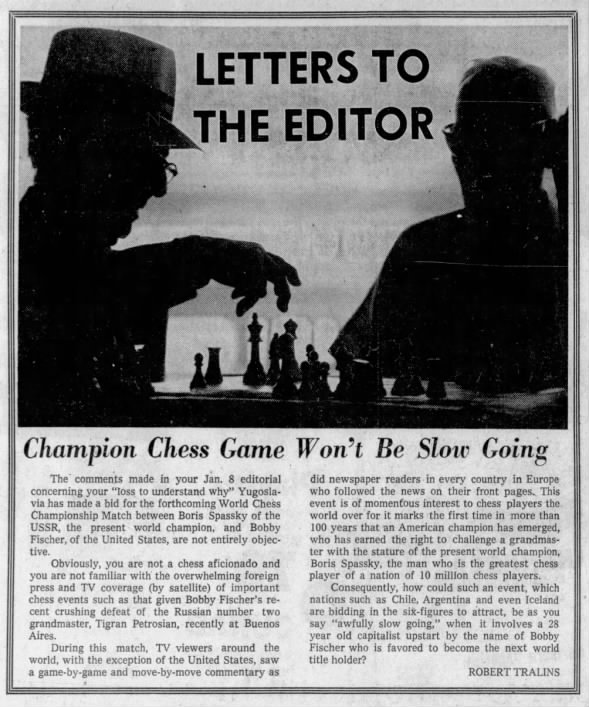 Letters To The Editor: Champion Chess Game Won't Be Slow Going Thu, Jan 13, 1972 – 138 · The Miami Herald (Miami, Florida) · Newspapers.com
Letters To The Editor: Champion Chess Game Won't Be Slow Going Thu, Jan 13, 1972 – 138 · The Miami Herald (Miami, Florida) · Newspapers.com
The Morning Call Allentown, Pennsylvania Saturday, January 15, 1972 - Page 12
Profit Snafu Perils World Chess Match
Belgrade (AP) — The bank sponsoring Yugoslavia's $125,000 bid for the Fischer-Spassky world championship chess match threatened to withdraw its offer Friday because it said the World Chess Federation reneged on a deal for the profits.
Petar Besaraba, director of the Yugoslav Export and Credit Bank, said Belgrade offered $2,000 more than any other city on the understanding Belgrade would retain all profits.
Now the chess group was saying income from television coverage would have to be split four ways: between the sponsor, the chess association and the two players, Besaraba complained.
Besaraba said on the chess association's terms American challenger Bobby Fischer and Russia's reigning world champion, Boris Spassky, would certainly get more money, but the sponsoring bank would go in the hole.
Dr. Max Euwe, president of the chess association, was expected in Belgrade this weekend for talks with the bank. The match is to be played in the first half of this year.
New York Times, New York, New York Monday, January 17, 1972 - Page 28
Chess by Al Horowitz
America's top chess player, Bobby Fischer of New York, scored a shutout in a simultaneous exhibition at the Westchester Shore Chess Club on Jan. 9, when he defeated all 20 opponents in 46 minutes, averaging a fraction above two minutes a game.
The Philadelphia Inquirer Philadelphia, Pennsylvania Tuesday, January 18, 1972 - Page 2
Fischer No Genius, Russian Says
Tigran Petrosian, the former world chess champion from the Soviet Union, said American world title contender Bobby Fischer was no genius. But he refused to speculate on the outcome of the next world title match.
Fischer, of Brooklyn, defeated Petrosian 6.5 to 2.5 when they met in Buenos Aires late last year for the right to play present champion Boris Spassky of the Soviet Union. The site of the match this spring has not been chosen.
Petrosian said in an interview by the official Yugoslav news agency Tanjug that he felt Fischer “is certainly not a genius.” But asked to speculate on the outcome of the spring title match with Spassky, Petrosian would say only, “It is important to play—not to win.”
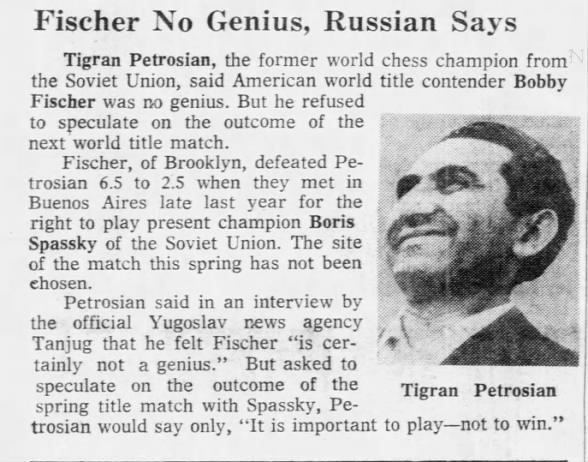 Fischer No Genius, Russian Says Tue, Jan 18, 1972 – Page 2 · The Philadelphia Inquirer (Philadelphia, Pennsylvania) · Newspapers.com
Fischer No Genius, Russian Says Tue, Jan 18, 1972 – Page 2 · The Philadelphia Inquirer (Philadelphia, Pennsylvania) · Newspapers.com
The Daily Times Salisbury, Maryland Thursday, January 20, 1972 - Page 14
From the Sidelines: Check and Mate by Rick Cullen, Times Sports Editor
The call is placed to the Park - Sheraton Hotel in New York City.
The telephone in room 2267 rings three times before there is an answer.
“Hellllllooo,” answers the victim of the early (9 a.m.) call.
After explaining my business and purpose for calling, Bobby Fischer reluctantly agrees to a brief interview. And brief it was — as if he were paying for the call.
In almost any other country, Bobby Fischer would be rated a genuine sports hero on a par with Joe Namath, Ted Williams or Jerry West. But in this country, outside of a few blurbs in the newspapers and a spread in Life, Bobby Fischer is virtually unknown.
Mysterious and controversial, famous and infamous, one-time child prodigy and current U.S. chess champion, Fischer lives in hotel and motel rooms. He has no permanent residence, even though he was born [in Chicago] and raised in Brooklyn.
Some time before June 30, he will challenge the reigning world chess champion, Boris Spassky of the Soviet Union, for the title. The date the time and the place has not yet been determined.
There is little doubt that at age 28, Bobby Fischer is one of the best chess players in the world. Before meeting Tigran Petrosian for a match that ended recently, Fischer had won 20 straight games, most of them against fellow grandmasters. This is an incredible feat; it would be compared to bowling 20 straight 300 games or pitching 20 consecutive no-hitters.
In Argentina, where the Petrosian-Fischer match was held, fans lined up for tickets 12 hours before match time. The enthusiasm is everywhere except the U.S.
How does Fischer feel about the lack of interest in chess in this country.
“I think its pathetic. Everywhere in the world chess is regarded highly, but not here. I don't suspect it will ever really catch on here, even if I do become the champion.”
Fischer feels chess is a national sport and should be recognized. “I feel its comparable to basketball. Basketball players pass the ball around until they find an opening. Like chess, like the mating attack.”
He also believes a champion chess player must be in top physical condition. You have to concentrate in a tournament for five hours at a time, day after day. And when there's an adjournment, he said, you've gotta stay up late analyzing strategy. The tension and the need for stamina are brutal. One mental lapse and you're through. At the age of 40, he said, most chess players are over the hill. Just can't hack the strain.
“Are we about through?”
Just a couple more questions please.
“OK, but get on with them.”
At what age did you first become interested in chess?
“Six.”
Understand you are a high school dropout. Why?
“Why what?”
Why did you drop out of school?
“The tournament demands became too pressing. Are we about through?”
Any plans for retirement?
“Retirement! What could I do if I quit playing chess. No way. Are you through now? I was up all night and don't feel like an interview this morning — especially at this hour.”
CLICK!
The Central New Jersey Home News New Brunswick, New Jersey Thursday, January 20, 1972 - Page 4
Chess Summit Is Threatened
Belgrade, Yugoslavia (AP) — Belgrade threatened Wednesday to cancel its offer to host the Fischer-Spassky chess summit in protest against “flagrant violation” of the bidding terms.
The Export and Credit bank of Belgrade and the Chess League of Serbia—sponsors for the city of Belgrade—outbid all other world and Yugoslav would-be organizers of the match. The contest pits challenger Robert Fischer of the United States against world champion Boris Spassky of the Soviet Union.
But a second round of bidding ensued when other potential candidates pitched in with offers to relinquish income expected from television and film royalties in connection with the match—something Belgrade organizers calculated on keeping for themselves.
In a statement here Wednesday the Belgrade sponsors said bidding should have terminated Jan. 3, when Belgrade was proclaimed the top bidder in Amsterdam.
However, FIDE (the world chess federation) was reported seeking a possible share of television rights income for itself and the two players. The Yugoslav Chess Federation lodged a protest charging “flagrant violation of the initial terms of bidding.”
Pittsburgh Post-Gazette Pittsburgh, Pennsylvania Friday, January 21, 1972 - Page 23
Where Pittsburgh Chess Mates Gather by Mike Kalina
…In addition to sponsoring many local tournaments, the chess club also invites chess luminaries here to engage in simultaneous exhibitions with area players. Bobby Fischer, the U.S. chess whiz who soon will be competing for the world championship, played here a few years ago thanks to the backing of the Pittsburgh Chess Club. And he walked away with 154 victories out of a possible 155.
“Fischer is quite a player,” said one chess club member, not prone to overstatement, “and we here at the club feel that he is going to win the world title.”
If, indeed, he does, he will be the first chess shark to take the world championship trophy out of the Soviet Union since 1937.
The chess club also has a library for its members (more books have been written on chess than on all other games combined) and also publishes a house organ called “En Passant” — which is French for “in passing”, a certain chess move.
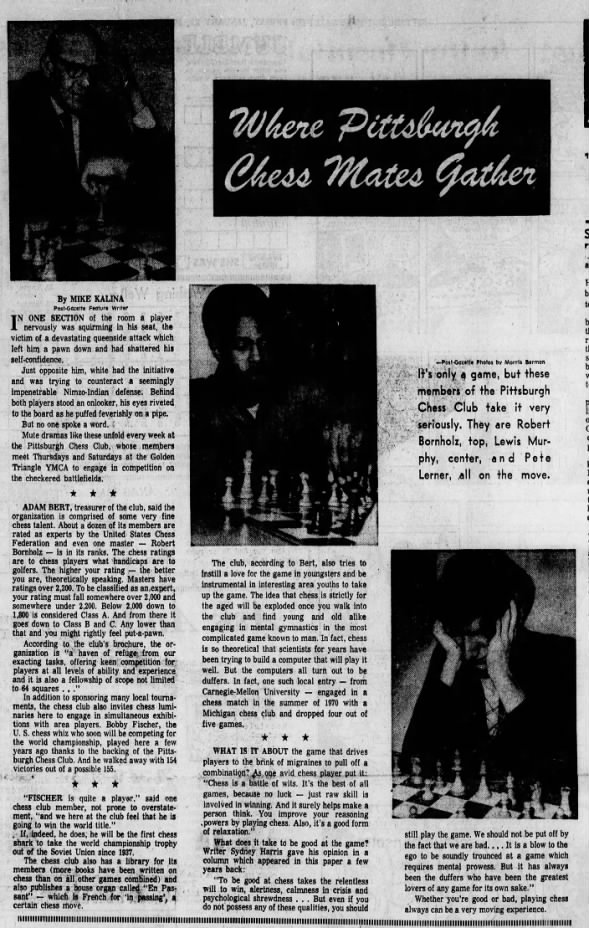 Where Pittsburgh Chess Mates Gather Fri, Jan 21, 1972 – Page 23 · Pittsburgh Post-Gazette (Pittsburgh, Pennsylvania) · Newspapers.com
Where Pittsburgh Chess Mates Gather Fri, Jan 21, 1972 – Page 23 · Pittsburgh Post-Gazette (Pittsburgh, Pennsylvania) · Newspapers.com
Sioux City Journal Sioux City, Iowa Saturday, January 22, 1972 - Page 1
Chess Match
During the last year, I have become one of millions across the country to discover the fun and excitement of chess. In the last two years, there has been a tremendous rise in the number of chess players in the United States. As a result, international championships are of great interest, especially Bobby Fischer's upcoming match with Boris Spassky in Belgrade, Yugoslavia, in May. Where can I obtain a play-by-play transcript of the Fischer-Spassky match? —Jim Smith, Le Mars, Iowa.
EDITOR: You assume a great deal. Officials of the Sioux City Chess Club indicate no location or date has been picked for the world champion chess match. Belgrade is the highest bidder for the match, but it could be held in the United States or Argentina. Also, the match may be conducted in April, May or June. The English notation of the game can be obtained by subscribing to Chess Newsletter, which is published the 1st and 15th of each month. It can be ordered through Chess Digest Magazine, P.O. Box 21225, Dallas, Texas 75211.
Results also will be carried in the Chess Express, published twice each month in Switzerland. A subscription may be ordered through Tru-Test Co., Box 5268, Cleveland, Ohio, 44101.
Chicago Tribune Chicago, Illinois Sunday, January 23, 1972 - Page 240
Can Computers Ever Learn How to Be People?
Reviewed by Martin Gardner
…No digital computer, Dreyfus is convinced, will every play grandmaster chess. Bobby Fischer just doesn't think digitally. It is true that MacHack, the famous chess program at Minsky's Article Intelligence Laboratory at M.I.T., does not play even master chess, although a few years ago, to the whoops of Dreyfus's critics, it trounced him in a game. Moreover, MacHack does not plan moves in the same way Fischer does. (No one knows how Fischer's brain or anybody else's brain works. We don't even know how it remembers anything.) But neither does the ticktacktoe machine calculate the same way as a 10-year-old who plays an unbeatable game. Nowhere does Dreyfus make clear why MacHack could not learn to play master chess by its own electronic techniques…
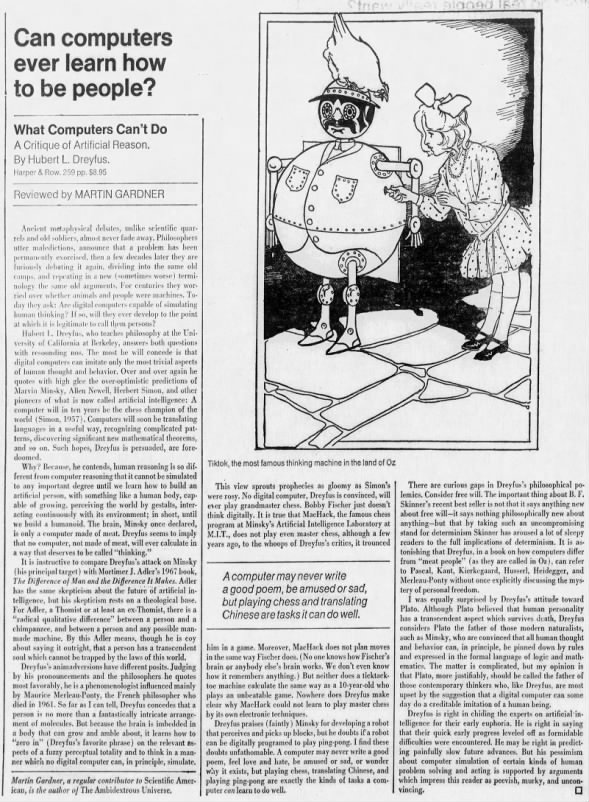 Can Computers Ever Learn How To Be People? Sun, Jan 23, 1972 – 240 · Chicago Tribune (Chicago, Illinois) · Newspapers.com
Can Computers Ever Learn How To Be People? Sun, Jan 23, 1972 – 240 · Chicago Tribune (Chicago, Illinois) · Newspapers.com
[[Martin Gardner seems to understand Artificial Intelligence, but proved his fallible credulity by publishing the circus of inanities made up from thin air by Ron Gross in the “Skeptical Inquirer” magazine. The sole intent of Gardner was obvious, to dehumanize Robert J. Fischer, through a repetition of sordid pseudoscientific allegations further promoted in 2017 to me, by Frederic Friedel via email. For instance, Ron Gross made a claim that was entirely medically unsound, unscientific, illegal, that supposedly Robert Fischer sought out a licensed dentist to ‘remove fillings in his teeth, exposing Master Bob's dental cavities to bacteria’ [thus … six months later, exposed said dentist to a malpractice suit, loss of license to practice dentistry with additional heavy fines and jail time …] sure he did! just like “Science” publications that act as a medium for idle speculations and rumors should be trusted by the public at large.]
Harvard Business Review
Why the News Is Not the Truth
https://hbr.org/1995/05/why-the-news-is-not-the-truth
St. Joseph News-Press/Gazette St. Joseph, Missouri Tuesday, January 25, 1972 - Page 14
Bobby Fischer May Pay Visit to Yugoslavia
Belgrade (UPI) — United States chess grand master Bobby Fischer may come to Yugoslavia later this month to discuss conditions for his world chess title match against Soviet titleholder Boris Spassky. Yugoslav chess sources said today.
Belgrade and Sarajevo are the two Yugoslav cities which have offered to organize the Fischer-Spassky match, which probably will be played in November or December.
Two weeks ago Dr. Max Euwe, president of the International Chess Federation (FIDE), visited Belgrade and Sarajevo and talked with organizers.
The final decision on the venue of the match is to be taken by Fischer and Spassky themselves.
Lincoln Journal Star Lincoln, Nebraska Wednesday, January 26, 1972 - Page 30
Aleksander Liepnieks Reports on the Looming Shadow of Soviet Censorship
Don Forsythe, Journal Sports Editor:
Chess doesn't immediately come to mind when you're discussing lucrative paychecks for participation, but the stakes will be impressive when Bobby Fischer of the United States and Boris Spassky of Russia meet sometime this year for the world championship.
Lincoln's Aleksander Liepnieks who keeps close watch on the chess world, offered a briefing on the Fischer-Spassky showdown after a visit last week with Col. Ed Edmondson, executive director of the U.S. Chess Federation who serves as Fischer's manager.
At the moment, deliberations are continuing on a playing site. Yugoslavia has bid $152,000 for the right to conduct the competition with other bids of $150,000 from Argentina and $125,000 from Iceland.
Liepnieks speculates the championship will be held in Iceland. “The Russians won't agree on Yugoslavia. Fischer is very much liked in Yugoslavia. He's a national hero there. He's also very popular in Argentina.” he says.
Even though the Iceland bid isn't as great as the others the Fischer-Spassky winner stands to collect over $78,000 from a $125,000 purse. Fischer, who defeated Tigran Petrosian in Buenos Aires in the championship series semifinals, is hopeful of becoming the first official world champion from the U.S. Russians have held the title since 1948.
Fischer, incidentally, had his tournament start at age 12 in the 1955 U.S. Junior Chess Championship in Lincoln.
The Spokesman-Review Spokane, Washington Thursday, January 27, 1972 - Page 38
2 Cities Bidding for Chess Match
Belgrade, Yugoslavia (AP) — Edmund Edmondson, executive director of the American Chess Federation, arrived here Wednesday at an invitation of prospective organizers of the chess match between U.S. champ Bobby Fischer and world champion Boris Spassky of the Soviet Union.
Edmondson will inspect conditions for holding the match in Belgrade and Sarajevo later this year.
Belgrade's Yugoslav Crediting and Export Bank and the Chess League of Serbia, the sponsors, offered a purse of $152,000 if Fischer and Spassky agree to play in Belgrade.
Star-Gazette Elmira, New York Sunday, January 30, 1972 - Page 77
GSA vs. Erasmus Hall High School
… The keyword in Lee's happiness at GSA is “caring.”
“In New York, teaching is just a job, nobody cares about how you're doing or whether you even come to class,” he said. “It's different up here. The teachers are real friendly and we know we can go to them with our problems.
“It's much easier to study, too, and I guess it's paid off. In New York I had a D average but here I get B's in my courses.”
Lee's ambition is to continue his education in college and then return as a teach or coach at GSA.
“I like to work with kids,” he said, “and I'd like to help GSA because they helped me.”
Brad American, a GSA senior, attended Brooklyn's Erasmus Hall High School, at one time one of the top academic schools in the city and the alma mater of such personalities as Barbara Streisand, and chess champion Bobby Fischer, great Columbia and Chicago Bear quarterback Sid Luckman and Philadelphia '76er basketball star Billy Cunningham. Today its just another of the overcrowded and troubled schools common to New York.
“The biggest difference here is that someone yells at me once in a while. Like to get me up in the morning. But I like it here. It's nice, I get good marks, learn and meet people. And most important, I'm doing better.”
One of American's teachers said that the GSA student recently handed in a lengthy report. “He said it was the first he had ever done,” the teacher stated.
“At Erasmus, if you didn't get what the teacher said the first time, you didn't get it at all and most of the time I didn't get it too often,” American chuckled.
“But here the classes are smaller and I catch on to what's happening.”
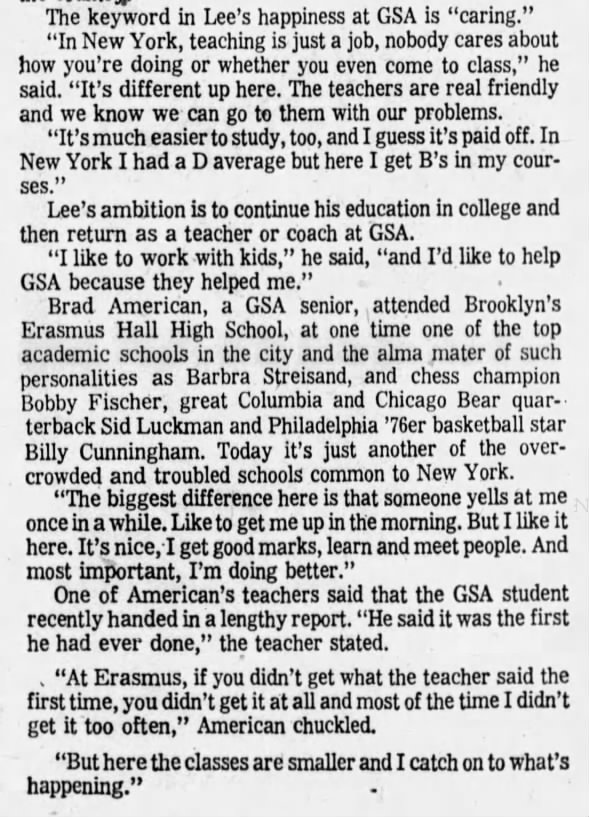 GSA vs. Erasmus Hall High School Sun, Jan 30, 1972 – 77 · Star-Gazette (Elmira, New York) · Newspapers.com
GSA vs. Erasmus Hall High School Sun, Jan 30, 1972 – 77 · Star-Gazette (Elmira, New York) · Newspapers.com
[Sounds like the kind of academic environment conducive to young, future chess champions, on the Autism Spectrum, dropping out.]
The Vancouver Sun Vancouver, British Columbia, Canada Monday, January 31, 1972 - Page 48
Fischer in Amsterdam for Chess Title Talks
Amsterdam (UPI) — U.S. grandmaster Bobby Fischer arrived in Amsterdam Sunday for talks concerning the date and site of his world chess title match with world champion Boris Spassky of the Soviet Union.
Fischer was welcomed at Amsterdam airport by Max Euwe, president of the International Chess Federation (FIDE) and world champion from 1935 to 1937. Fischer, accompanied by his U.S. Chess Federation official Ed Edmondson, said he was tired and went straight to bed.
Euwe later said Spassky had submitted a list of four countries where he wanted to play. Fischer had listed only two possible sites, and neither of these were on Spassky's list, he said.
Euwe said he expected Fischer to name two more sites that were agreeable to him, and he said he hoped one of these would also be on Spassky's list.
Euwe did not say which sites were listed, but it is known that Yugoslavia, Argentina, Iceland, the U.S., Brazil, The Netherlands, Canada, West Germany and Greece submitted bids to host the championship.
Two bids were submitted from Yugoslavia: $152,000 on behalf of Belgrade and $120,000 on behalf of Sarajevo. Canada's bid was $75,000 on behalf of Montreal.
Winner of the match gets 62½ per cent of the money and the loser, 37½ per cent.
Fischer has said he would prefer to play in the country that offered the biggest amount of prize money. Spassky has said he also would strongly take into account the climate of the site.
Fischer earned the right to challenge Spassky for the chess crown by trouncing his three opponents in the candidates' tournament last year.
He defeated Mark Taimanov of the Soviet Union and Bent Larsen of Denmark by unprecedented 6-0 scores. In the final, he beat former world champion Tigran Petrosian of the Soviet Union 6½ points to 2½.
The date of the world title match also has to be negotiated. Euwe has said he wanted the match to start some time in May, but both players have said they preferred to start later in the year, in June or July.
The Courier Waterloo, Iowa Monday, January 31, 1972 - Page 5
Upsurge in Interest in Chess Here — Cedar Valley Club Tourney Expanded
The Cedar Valley Chess club will expand its annual championship competition to include players from Benton, Bremer, Butler, Buchanan, Fayette, Grundy and Tama counties.
In announcing this expansion, John Osness, tournament director, said that the feats of Bobby Fischer in becoming chief challenger for the World Chess championship have created an increase in interest in the game. Fischer is the United States' greatest chess player.
Open House Planned
An open house for beginning chess players is scheduled for the last weekend in March, and Waterloo will host the Iowa State championship April 22-23 at the Clayton House motel.
Chess Life and Review, January 1972 - Page 7
Fischer vs. Petrosian: Getting Ahead by Robert Byrne
Continued from December
After his unsettling start in the first three games, the openings of which were clearly to Petrosian's advantage, Bobby slowly began to get under way. It was Petrosian who backed away from the sharpest continuation in game four, either suspecting or discovering over the board that Fischer had a foolproof defense in hand. What it might have been I suggest in my note to White's move 12. Anyhow, Petrosian may have been a little bit rattled, since he made no serious attempt with the White pieces, acquiescing to wholesale liquidation and a quick draw.
The former world champion's super-cautious Petroff Defense in game five gave Bobby the chance for opening advantage for the first time in the match. Unfortunately, he did not follow it up correctly, running into a great deal of trouble, from which he just barely managed to escape. There was still no reason at this point in the series to be confident about Fischer's chances of ending up the victor.
But the sixth game was an altogether different story. Bobby answered Petrosian's offbeat Reti Opening very sharply, gaining a small but perfectly clear advantage. In the face of a lifeless game, in which he could only await possible attacks on both wings, Petrosian panicked, opening the Queenside for no good reason. Bobby immediately jumped at the opportunity, breaking through on the QB file, obtaining a protected passed QP and powerful control of Queenside terrain. After a beautifully played ending, Bobby went ahead in the match for the first time since game one.
Tigran V Petrosian vs Robert James Fischer Fischer - Petrosian Candidates Final (1971), Buenos Aires ARG, rd 4, Oct-12 English Opening: Symmetrical Variation. General (A30) 1/2-1/2 https://www.chessgames.com/perl/chessgame?gid=1106924
Game Four: English Opening
Tigran Petrosian Robert Fischer
1. c4 …
Despite his success with 1. P-Q4 in game two, Petrosian sticks to his favorite strategy of varying his openings as much as possible.
1. … c5
And Fischer stays with the same defense he used in game two of the Larsen match. He does not find it necessary to go for an unbalanced position by … P-K4, but aims for logical equality.
2. Nf3 g6
By playing this way, Bobby indicates once again that he is not the least bit concerned about the Maroczy bind which White can now head directly into.
3. d4 cxd4
There is no way to avoid the exchange, since … P-Q3; 4. PxP PxP; 5. QxQch KxQ leaves Black's King without good shelter in the center, and 3. … P-N3 4. PxP PxP; 5. Q-Q5 compels an unsound pawn sacrifice.
4. Nxd4 Nc6
5. e4 …
Opinions on this Maroczy formation (pawns at K4 and QB4 versus pawn at Q3) are still seesawing. Although Fischer has been very successful pro-Maroczy in the past, lately he has became contentedly anti-Maroczy.
5. … Nf6
6. Nc3 d6
7. f3 Nxd4
Since White's pawn bind restricts Black's space, the exchange of a set of minor pieces is advisable to avoid getting cramped.
8. Qxd4 Bg7
9. Be3 O-O
10. Qd2 Qa5
The big question of this game is why Petrosian did not play 12. N-Q5, which Polugaevsky has been so successful with. His game with Ostojic, Belgrade 1970, went … QxQch; 13. KxQ BxN (… NxN; 14. BPxN and White will land a Rook on the seventh rank). 14. BPxB KR-B1; 15. RxR RxR; 16. P-KN3! R-B2; 17. B-R3 N-Q2; 18. R-QB1 and White has a tremendous endgame.
The answer, I think, is that no one has tried 12. … QxP! which leads to an equal game after 13. NxPch K-R1; 14. B-K2 N-N1! 15. NxN KxN; 16. B-Q4 BxB; 17. QxB Q-R4ch; 18. K-B2 Q-QB4; 19. KR-Q1 KR-Q1. Unless Petrosian had spotted this, he would have had no reason to hold back on 12. N-Q5.
The text move renews the threat of N-Q5 by ruling out the reply … QxP.
11. Rc1 Be6
12. b3 Rac8
13. Be2 a6
Now this move is nothing more than a transparent draw offer, but O-O would be answered by … P-QN4! with a free game. If White wishes to retain any serious chances for complications, he must keep Black bottled up by P-QR4, even though that weakens his own Queenside squares somewhat.
14. Nd5 Qxd2+
15. Kxd2 Nxd5
16. cxd5 Bd7
17. Rxc8 Rxc8
18. Rc1 Rxc1
19. Kxc1 Kf8
20. Kc2 e6
1/2-1/2
Robert James Fischer vs Tigran V Petrosian Fischer - Petrosian Candidates Final (1971), Buenos Aires ARG, rd 5, Oct-14 Russian Game: Classical Attack. Closed Variation (C42) 1/2-1/2 https://www.chessgames.com/perl/chessgame?gid=1106927
Game Five: English Opening
Robert Fischer Tigran Petrosian
1. e4 e5
2. Nf3 Nf6
Once again Petrosian switches defenses, although his two previous ones were a success for him. Without question, he could count on running into improvements from Bobby. Besides, he had perfect results with the present defense in his match with Spassky.
3. Nxe5 d6
… NxP is an ancient blunder which loses a pawn after 4. Q-K2 P-Q4; 5. P-Q3 Q-K2; 6. PxN QxN; 7. PxP.
4. Nf3 Nxe4
5. d4 …
In the 1969 world championship match, Spassky relied on Lasker's favorite 5. Q-K2, but got nowhere with it after … Q-K2; 6. P-Q3 N-KB3; 7. B-N5 QxQch; 8. BxQ B-K2; 9. N-B3 P-B3; 10. O-O-O N-R3!
5. … Nf6
6. Bd3 Be7
Najdorf criticized this, claiming that Black should hurry with … B-N5 while he still has the chance. However, White would have a small advantage after 7. P-KR3 BxN; 8. QxB as well as after 7. … B-R4; 8. O-O B-K2; 9. R-K1 O-O; 10. QN-Q2 with the idea N-B1-N3.
7. h3 O-O
8. O-O c6
Fischer-Gheorghiu, Buenos Aires 1970, went 8. … R-K1; 9. P-B4 N-B3; 10. N-B3 P-KR3; 11. R-K1 B-B1; 12. RxR QxR; 13. B-B4 B-Q2; 14. Q-Q2 Q-B1; 15. P-Q5 N-QN5; 16. N-K4! with a very strong game for White.
9. Re1 Nbd7
10. Bf4 Re8
11. c4 Nf8
12. Nc3 a6
13. Qb3 …
The Queen is uselessly and awkwardly placed here, since the advance of the QNP cannot be prevented. To carry out his plan of doubling rooks on the K-file, Q-B2 was the move to retain his advantage.
Najdorf was strongly in favor of 13. P-Q5, which admittedly also favors White after … P-B4. But, I think White's winning chances are greater by keeping the center fluid.
13. … Ne6
14. Bh2? …
B-K3 was far better because now the Bishop is out of action here, a matter which becomes increasingly dangerous as the game progresses. At K3 the Bishop would stand in the way of White's projected doubled Rooks on the King file, but that would be only a temporary hindrance, since the Bishop would clear out whenever needed to unblock them.
14. … Bf8
15. Re2 b5
A necessary and good way to free his position, carrying with it the possibility … PxP, then … P-Q4 and … P-QB4!, for a sharp counter-attack at the right moment.
16. Rae1 Bb7
17. Qc2 g6
18. b4 …
Although this compels Black to break his queenside pawn front, in view of the threat to choke the QB by P-B5, it will be seen quickly enough that Petrosian is ready with some of the best defensive play of the match.
18. … bxc4
19. Bxc4 Nc7
Accepting the pawn sacrifice by 19. … P-Q4; 20. B-Q3 BxP is too dangerous, for 21. R-N1, BxN; 22. QxB R-R2; 23. Q-B1 not only leaves Black tied up on the Queenside but threatens a King attack with Q-R6, B-K5, N-N5, etc. Nor would 21. … Q-R4 work any better after 22. Q-N3 BxN; 23. QxQB NxP; 24. RxRch RxR; 25. N-N5 and the Black King cannot be defended since 25. … R-B1 is useless in view of 26. B-Q6.
The text, however, is excellent, preparing ingenious counterplay.
20. Bb3? …
If Fischer were aware of what his opponent is up to, he would have driven back a Knight by 20. RxR.
20. … Rxe2
21. Rxe2 Ncd5!
With an original attack on White's Queenside pawns, Petrosian takes the initiative. It will quickly be seen why he does not fear doubled pawns on the Queen file.
22. a3 a5
23. Nxd5 cxd5
24. b5 …
White has alternatives, but Black's weird pawn formation gives him a grip of steel on the center squares.
24. … a4!
Brilliantly demonstrating just how weak the White Queenside really is. Now 25. BxRP would be dangerous because … Q-R4; 26. B-N3 QxRP leaves the NP critically weak.
25. Ba2 Qb6
26. Qb1 …
The only move, for 26. Q-Q3? R-R4; 27. R-N2 B-QR3 had to be avoided.
26. … Ra5
Najdorf criticized this move, claiming Petrosian's only chance to win lay in … B-KR3, cutting off the White QB from reentering the game and threatening R-QB1-Q8ch. Still, I don't find the situation at all clear after 27. Q-N4! N-K5; 28. B-N1 when White threatens to consolidate by B-Q3 and R-B2.
27. Rb2 Ne4
28. Bf4 Nc3
29. Qc2 Rxb5
As difficult as Fischer's position looks, it seems he can defend it. 29. … NxB; 30. RxN QxNP; 31. R-N2 Q-Q2; 32. Q-N1 B-B3; 33. R-N8 R-N4; 34. QxR! BxQ; 35. B-R6 Q-K1; 36. RxQ BxR; 37. BxB KxB is a dead drawn endgame. On 32. … R-R2, White simply plays 33. R-N6 followed by Q-N4, and any thought of Black winning is a dream.
Also 29. … NxP; 30. B-Q2 R-R1; 31. Q-N1 B-B3; 32. BxP BxB; 33. RxN Q-B3; 34. R-N8 RxR; 35. QxR Q-R1; 36. QxQ BxQ is insufficient to win, although Black's Bishops give him the edge. But Black must not try 34. … BxN? 35. PxB QxP; 36. B-R6.
The text move is virtually a draw offer.
30. Rxb5 Nxb5
31. Qxa4 Qa6
Getting rid of Fischer's only real weapon, the QRP.
32. Qxa6 Bxa6
33. Be3 …
Neither B/2xP? nor P-QR4? nor B-B1? is playable since 33. … N-B6! wins a piece.
33. … Nxa3
34. Bxd5 …
Petrosian offered a draw here, but Bobby insisted on playing a few more moves.
34. … Bc4
35. Bc6 Nc2
36. Bd2 Be2
37. Be4 Bxf3
38. Bxc2 Bd5 1/2-1/2
Tigran V Petrosian vs Robert James Fischer Fischer - Petrosian Candidates Final (1971), Buenos Aires ARG, rd 6, Oct-17 Zukertort Opening: Sicilian Invitation (A04) 0-1 https://www.chessgames.com/perl/chessgame?gid=1106930
Game Six
Nimzovich Opening
Tigran Petrosian Robert Fischer
1. Nf3 c5
2. b3 d5
3. Bb2 …
Petrosian won the ninth game of his match with Korchnoi using this rarely played opening, but the present game will do nothing for its popularity.
3. … f6
This, the most aggressive reply, aims at a wholesale pawn advance in the center to jam the enemy QB. If there is to be a refutation of this opening, it can only be accomplished in this ambitious manner.
4. c4 …
As he did against Korchnoi, Petrosian transposes into a reversed Benoni, without accomplishing anything to improve the situation of the QB.
4. … d4
5. d3 e5
6. e3 Ne7
7. Be2 Nec6
In case of PxP BPxP, Black can bring the QN via Q2 to the powerful QB4 square, the reason for avoiding the routine N1-B3.
8. Nbd2 Be7
9. O-O O-O
10. e4 …
There is no point in maintaining the center tension, since Black is too strong there.
10. … a6
11. Ne1 b5
This advance is a preparation for Black to take the initiative on the Queenside, but what is especially interesting is that Fischer does not bother to prevent the exchange of his better Bishop by … B-K3; 12. B-N4 B-B2; instead relying on the fact that his remaining pieces will be superior to his opponent's because his pawns command more space.
12. Bg4 Bxg4
13. Qxg4 Qc8
14. Qe2 …
The exchange of Queens would give Black a strong endgame since he could then operate immediately with such threats as QN-Q2, KR-N1, B-Q1-R4 and N-N3. In all this the awkward placement of White's QB is the culprit.
14. … Nd7
15. Nc2 Rb8
16. Rfc1 Qe8
17. Ba3 …
This is a typical Petrosian do-nothing move. He wins a lot of games just fooling around, but here he has the wrong opponent for this kind of nonsense. However, his very passive opening makes it difficult for him to come up with any kind of positive plan.
17. … Bd6
18. Ne1 g6
19. cxb5? …
Was this panic at the thought of what Fischer might do on the Kingside, given enough time? Now Black's Queenside qualitative pawn majority is mobilized for a breakthrough at QB5.
19. … axb5
20. Bb2 Nb6
21. Nef3 Ra8
22. a3 Na5
23. Qd1 Qf7
24. a4 …
Best under the circumstances, since it would be absolutely fatal to wait for Black to develop further by KR-B1 before making his breakthrough.
24. … bxa4
25. bxa4 c4!
Obtaining a passed QP as against White's weak isolated RP.
26. dxc4 Naxc4
27. Nxc4 Nxc4
28. Qe2 …
The best defense because Black must now hurry his attack before having to contend with the strong consolidating N-K1-Q3.
28. … Nxb2
Maybe Fischer would have done better to keep up the pressure by 28. … KR-B1, since 29. N-K1 B-N5; 30. N-Q3 fails against 30. … NxB! and if 31. NxB NxP should be an easy win.
29. Qxb2 Rfb8
30. Qa2 …
Again the best defense because now Black can only play for a win by allowing White counterplay.
30. … Bb4
31. Qxf7+ Kxf7
32. Rc7+ Ke6
Now 33. RxP? loses to … B-B6; 34. R-KB1 RxP, followed by the exchange of Rooks and the victorious march of the QP.
33. g4! …
Opens air for the King, restrains … P-KB4 and even threatens P-N5 in some variations. Petrosian is defending himself with might and main.
33. … Bc3
34. Ra2 Rc8
35. Rxc8 …
Najdorf and Suetin claim that 35. RxP draws, giving … R-B5; 36. R-QN7 R5xP; 37. RxR RxR; 38. R-N6ch K-B2; 39. P-N5 P-Q6; 40. R-Q6! But 35. … P-Q6; 36. R-QN7 B-R4; 37. R-N5 (not R-N3? R-B7), R-B5; 38. R-Q5 RxKP; 39. RxP RxPch; 40. K-B1 R-QB1 is terrifically strong for Black.
35. … Rxc8
36. a5 Ra8
37. a6 Ra7
38. Kf1 g5
While the King runs after the QRP, he eliminates a pawn breakup by P-N5.
39. Ke2 Kd6
40. Kd3 Kc5
41. Ng1 Kb5
42. Ne2 …
This was the sealed move, leading to a fascinating endgame. The tricky point for Black is that he can never exchange Rooks without permitting White a foolproof blockade of the position by bringing the Knight to Q3.
42. … Ba5
43. Rb2+ …
In my analysis at adjournment, I never even considered this move, but spent all my time on 43. N-B1 RxP; 44. N-N3 R-R1 (but not 44. … K-N5; 45. N-R1 R-B3; 46. N-B2ch K-N6; 47. NxPch and draws. In this line, 46. … K-N4; 47. N-R3ch, K-B4; 48. N-B4 B-B6; 49. R-R7 also leaves Black tied up) 45. R-R1 R-R2; 46. R-R2 K-N5; 47. N-R1 R-QB2; 48. N-B2ch K-N6; 49. RxB R-B6ch; 50. K-Q2 RxNch; 51. K-K1 P-Q6 and wins.
43. … Kxa6
44. Rb1 Rc7
45. Rb2 Be1
Simpler, I thought, was … R-B4 to break through to the sixth or eighth rank by … B-N3, when the lone White Rook cannot guard both the Rook and Knight files. The reply 46. R-B2 R-N4; 47. R-B6ch K-N2; 48. RxP fails against R-N6ch; 49. K-B4, P-Q6!
46. f3 Ka5
I still think this is needlessly complicated and stick by my suggestion in the previous note.
47. Rc2 Rb7
48. Ra2+ Kb5
49. Rb2+ Bb4
50. Ra2 Rc7
51. Ra1 Rc8
52. Ra7? …
This gives Fischer just what he was playing for. White had nothing to do but hold his ground and wait for Black to reveal his plan.
52. … Ba5
53. Rd7 Bb6
54. Rd5+ Bc5
55. Nc1 Ka4
56. Rd7 Bb4
57. Ne2 Kb3
58. Rb7 Ra8
59. Rxh7 …
This move is a preparation for resignation. He must have been counting on 59. N-B1ch K-N7; 60. N-K2, and saw at the last moment that 60. … R-R6ch! 61. K-B4 P-Q6; 62. RxBch K-B7 queens the pawn by force.
59. … Ra1
60. Nxd4+ …
N-N3 was useless—60. … R-R7; 61. N-B1 R-KB7 and it's all over.
60. … exd4
61. Kxd4 Rd1+
62. Ke3 Bc5+
63. Ke2 Rh1
64. h4 Kc4
65. h5 Rh2+
66. Ke1 Kd3 0-1
To be concluded













